Bali Holiday Secrets

Bali Tourist Tax: What you need to know
updated April 5, 2024, 8:12 pm 54.3k Views 3 Comments
The Bali Tourist Tax has just been introduced by the Bali Provincial Government and will most likely apply to you if plan on visiting Bali sometime soon.
Bali Immigration is still an evolving entity and its laws and regulations are always changing – even I find myself confused as whether or not certain laws have already been implemented or is still in the approval process.
If you are arriving at Bali Airport soon, here’s all you need to know about the new Bali Tourist Tax.
1. How much is the Bali Tourist Tax?
The Bali Tourist Tax or Tourist Levy costs 150,000 IDR – approximately $15.00 AUD, $10.00 USD, or 9.00 EUR – per person. This tax can be paid online or at Bali Airport.
This is a one-time fee upon entry to Bali and is won’t hurt your pocket too much compared to most countries who do charge a tourist tax – which is usually added on to accommodation costs per night .
2. When is the Bali Tourist Tax effective?
The Bali Tourist Tax is effective as of February 14th 2024 .
It seems that this tourism levy will be in place permanently.
3. How to pay the Bali Tourist Tax?
Luckily we live in the age of the internet. The Bali Tourist Tax can be paid online at the LoveBali.BaliProv official website.
This is the official website to pay the Bali Tourist Tax, so beware if other websites are claiming to do so as well. If you’re not a native English speaker, the LoveBali website also offers translations in Arabic, Spanish, German, Indonesian, and Chinese.
You can pay the Bali Tourist Tax online with Visa, MasterCard, American Express, and a few other local and international payment methods such as QRIS and Bank transfer.
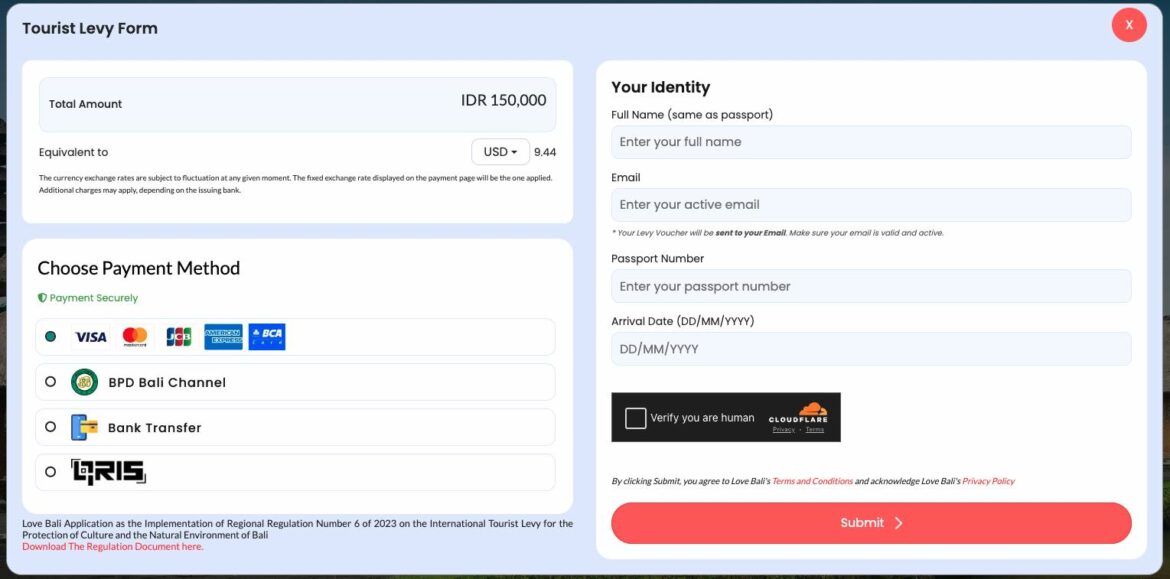
The form is quite simple to fill out and it should only take you about a minute. It will ask you for your full name – same as your passport, your email, your passport number, and your arrival date. You and your family can also pay as a group. If you don’t know your arrival date yet, I suggest waiting until you book your flight just to be on the safe side.
After the Bali Tourist Tax has been paid, you should receive a confirmation email containing a QR Code. Keep this handy for when you arrive because you’ll need to scan it at checkpoints when you arrive at Bali’s I Gusti Ngurah Rai International Airport. If you can’t find it in your inbox, make sure to check your spam / junk folder.
If you’re out of cash and you need to access an ATM at the airport, here my guide on how to withdraw money from ATM at Bali Airport .
4. Can I pay the Bali Tourist Tax at Bali Airport?
Yes. If you somehow couldn’t pay the Bali Tourist Tax online or didn’t know about it, you can simply pay the tourism levy in Indonesian Rupiah (IDR) at one of the checkpoints after entry to Bali.
Bali Airport is currently in the process of installing more checkpoints to make your arrival procedure more smooth.
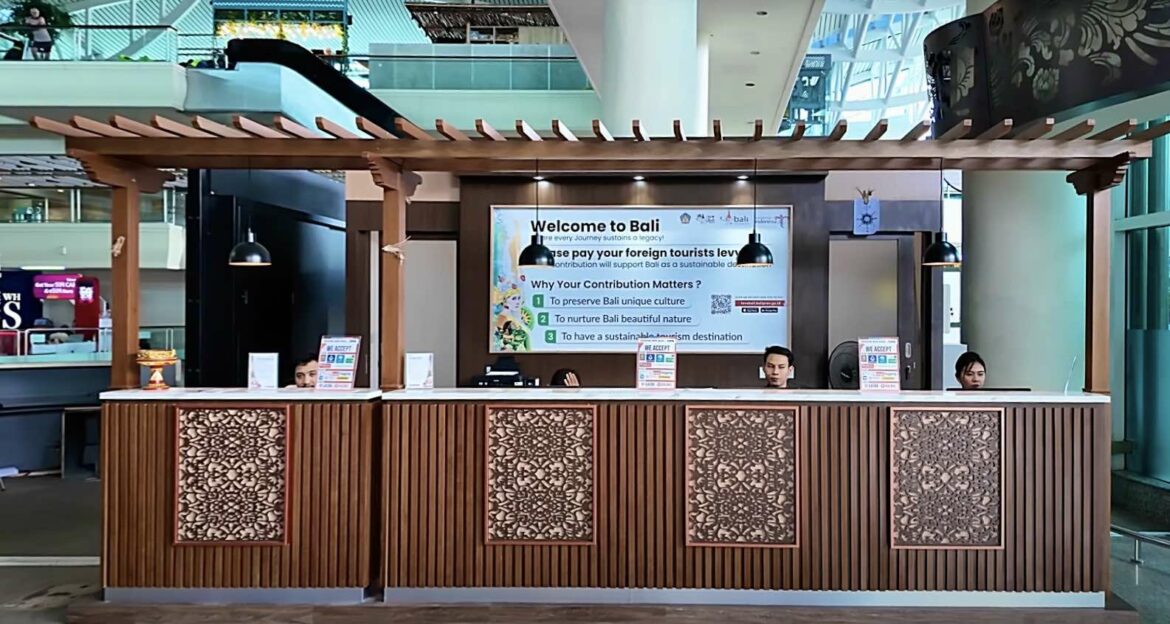
5. Do I need to pay again if I travel to another island?
So far, no. If you’re planning on a transfer to Gili Islands (Gili T, Gili Meno, or Gili Air) or anticipate a snorkelling trip in Nusa Penida , you won’t have to worry about paying the Bali Tourist Tax again when you return to Bali.
Keep in mind, this might change. But at the time of writing this, there are no checkpoints to pay any taxes at Bali harbours (excluding coming from Java through Gilimanuk) – other than the regular harbour fees.
6. Who does the Bali Tourist Tax apply to?
Generally, all foreigners arriving in Bali must pay the Bali Tourist Tax – regardless of age.
This tax also applies if you are entering Bali through a domestic flight, for example: flying from Singapore to catch a connecting flight in Jakarta to head to Bali. If you plan on transferring from Gilimanuk Harbour , you will also need to pay the tax. So, no, you won’t be able to save $15 by flying to Jakarta first.
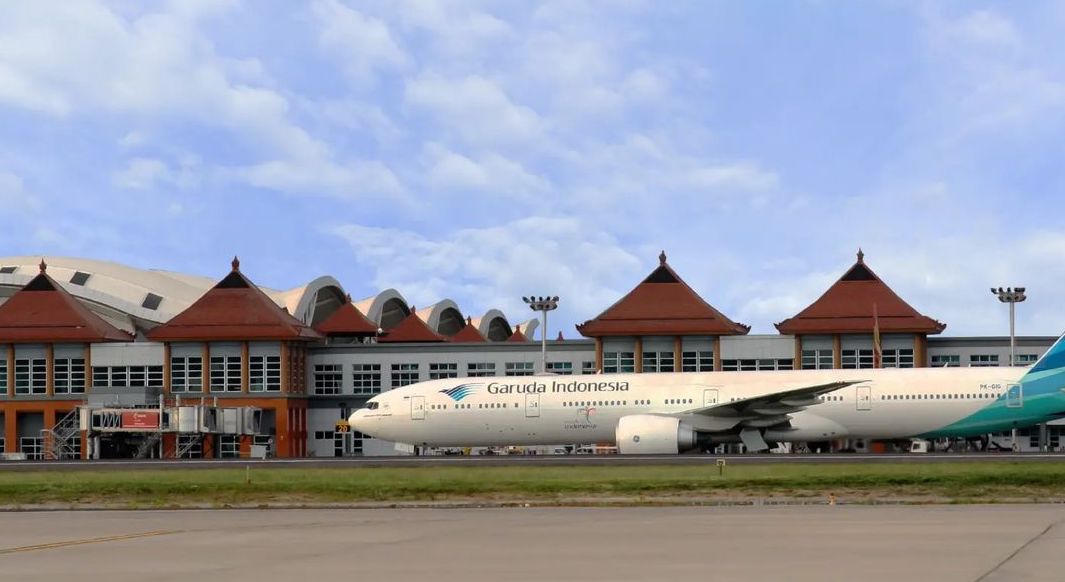
Keep in mind, as the name ‘ Bali Tourist Tax’ states, this tax only applies to international visitors who are coming to Bali. If you are headed directly to Jakarta, Bandung, or any other city in Indonesia, you can forget about this tax.
7. Who is exempted from the Bali Tourist Tax?
If you are included in the following list, you won’t have to worry about paying the Bali Tourist Tax upon arrival at Bali Airport:
- KITAS Holders
- KITAP Holders
- Diplomatic Visa holders
- Crew of conveyance
- Family Unification Visa holders
- Student Visa holders
If you hold any other type of Visa issued by Indonesian Immigration, such as the Golden Visa, you can also apply for an exemption on the Bali Tourist Tax payment website.
8. Do I have to pay the Bali Tourist Tax?
If you plan on entering Bali and experiencing what this beautiful island has to offer, then yes, you have to pay the Bali Tourist Tax. There’s no other way around it
According the Bali Provincial Government, foreigners who refuse to pay the required tourist tax / tourist levy will be restricted from entering Bali.
9. What is the Bali Tourist Tax used for?
Contributions to the Bali Tourist Tax fund will essentially be used to preserve the Balinese culture and its arts, heritage, traditions, and local wisdom. The Bali Tourist Tax fund is also aimed at protecting Bali’s breathtaking nature – a characteristic that can slowly wither if left unattended.
In summary, both of these goals above will actually enhance your holiday experience in Bali. By preserving the Balinese culture and Bali’s natural environment, you can have the most authentic holiday in a culturally strong destination.
Love Bali is an organization initiated by the Bali government aimed at enforcing the ‘Comprehensive Development Plan’ policy. Essentially, the Comprehensive Development Plan involves cultural and natural preservation initiatives mentioned above.
10. What else I need to know?
That’s it! It’s really not that big of a deal as many people are claiming it to be. Simply put, it’s a small tax to support Bali’s culture and natural environment. I’m honestly not against this tourist tax. If used responsibly, these funds can also help keep the beaches and rivers clean.
Remember this is a relatively new tax and will very likely be altered or changed during the course of the year. I’ll do my best to keep the information on this page updated.
If you’re planning a trip to Bali, consider booking my Bali Airport Transfer with Private Car and Driver . I work with a handful of some of the best Bali drivers who provide Day Tours and Transfers . You can even book your own Private Car and Driver for the day.
If you already have your own itinerary planned out and organized, no worries. I’m glad that this information here can at least help clear the air on the Bali Tourist Tax confusion. See you soon!

Bali Airport
© 2024 Bali Holiday Secrets. Hosted with Cloudways .
Bali is imposing a tourist tax on visitors from February 14. Here's what you need to know
The Indonesian province of Bali has long been one of the most popular tourist destinations for Australian travellers.
But as of Wednesday, there will be an extra requirement people travelling to the tourist hotspot will need to factor into their plans.
It's known as the Bali tourist tax.
What is the Bali tourist tax?
It's a small fee that will be imposed by the Indonesian government from February 14, 2024 .
It's only for people who travel to the province of Bali.
People who travel to other Indonesian provinces will not have to pay the tax.
How much will it cost?
It will cost 150,000 IDR per person , which equates to about $15.
How can I pay the tourism levy?
Visitors can pay online via the LOVE BALI website or mobile app by bank transfer, virtual account, or Qris payment.
They will be required to provide the following information:
- Passport number
- Arrival date
Visitors will then receive a voucher by email, which they can then scan upon arrival at the relevant checkpoints.
Cashless payments can also be made at Bali's I Gusti Ngurah Rai International Airport (DPS), as well as any other harbourside entry point.
Up to 18,000 people fly into Bali each day. If you are concerned about encountering queues, remember the Indonesian government says it will have at least 20 officers on duty to help out.
Plus, it has signed a partnership deal with Indonesia's BRI Bank to ensure the process is quick and easy.
Is it a one-off fee?
Yes , so long as you don't leave and come back.
If you leave Bali and enter another province, for example Lombok, then you'll have to pay the tax again upon re-entry.
But because the following three three islands are part of Bali Province, you won't have to pay the tax again if you travel to and from:
- Nusa Penida
- Nusa Lembongan
- Nusa Ceningan
That's because the fee is a tax that only applies to province of Bali.
What will the new tourist tax be used for?
We've known this extra expense has been coming since it was announced last September.
The Indonesian government says it's part of its efforts to conserve the island's natural environment and culture and improve the quality of services and safety standards experienced by tourists.
The tax could bring in nearly $185,000 each day.
That is based on figures reported by the The Bali Sun, which says about 4.5 million international tourists visited the island last year.
What happens if I don't pay?
You could be fined or deported .
Indonesian authorities have been cracking down on unruly behaviour since setting up the Bali Becik Task Force last August.
They've set themselves a goal of performing 100 immigration-control operations every month — and that's expected to lead to more fines and deportations.
But there are some people who will not have to pay the Bali tourist tax including:
- Diplomatic and official visa holders: Those visiting Indonesia to conduct government business, a diplomatic posting, or special assignments in Indonesia
- Conveyance crew: Those working on board a ship
- KITS/ KITAP holders: Those who possess a Residence Permit Card for a temporary, limited or permanent stay to live and work
- Family unification, golden and student visa holders: Those helping family settle, corporate investors and students
- Specific non-tourist visa holders
Do you need a visa for Bali?
The visa on arrival (VOA) costs 500,000 IDR or about $50 and lasts up to 30 days.
Australia is one of 159 countries whose tourists must pay the fee — which covers travel all over Indonesia, not just Bali.
- X (formerly Twitter)
Related Stories
How drinking on holiday could impact your travel insurance claim.
Travellers and accommodation providers falling victim to major Booking.com scam
Why is overseas travel so expensive and how can I sneak in a low-cost getaway?
- Tourism and Leisure Industry
- Travel and Tourism (Lifestyle and Leisure)
- Destinations
How to pay Bali’s new tourist tax
The entry requirements for Bali are changing from February 14. Here is what you need to do before you arrive.

Silly mistake that cost me $500 in Bali
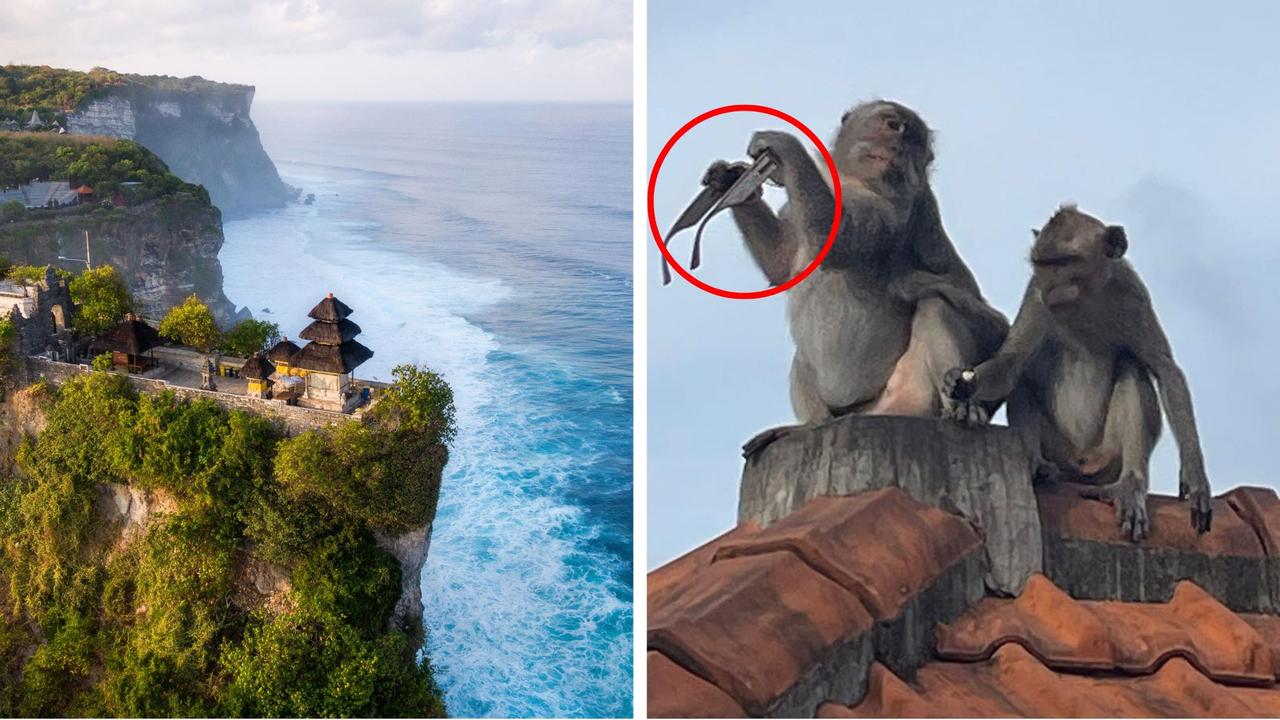
Major call for infamous Bali monkeys

Bali’s surprise move after influx of tourists
Australians heading to Bali from Wednesday will need to pay a new tourist levy to enter the popular holiday island.
Travellers must pay 150,000IDR per person (about $15).
Here is what you need to know.
How to pay the tourist levy
You can pay the $15 fee via the lovebali.baliprov.go.id website or Love Bali app.
You will need to enter your details, including your passport number and arrival date.
Then you can choose your payment method and once successful, you will have a ‘Levy Voucher’ sent to your email.
It is important to make sure the voucher is valid and active as your will need to present it at scanning checkpoints when entering Bali.
There will also be a counter to pay the fee by debit or credit card at I Gusti Ngurah Rai International Airport or Benoa Harbour, but this is not the method encouraged.
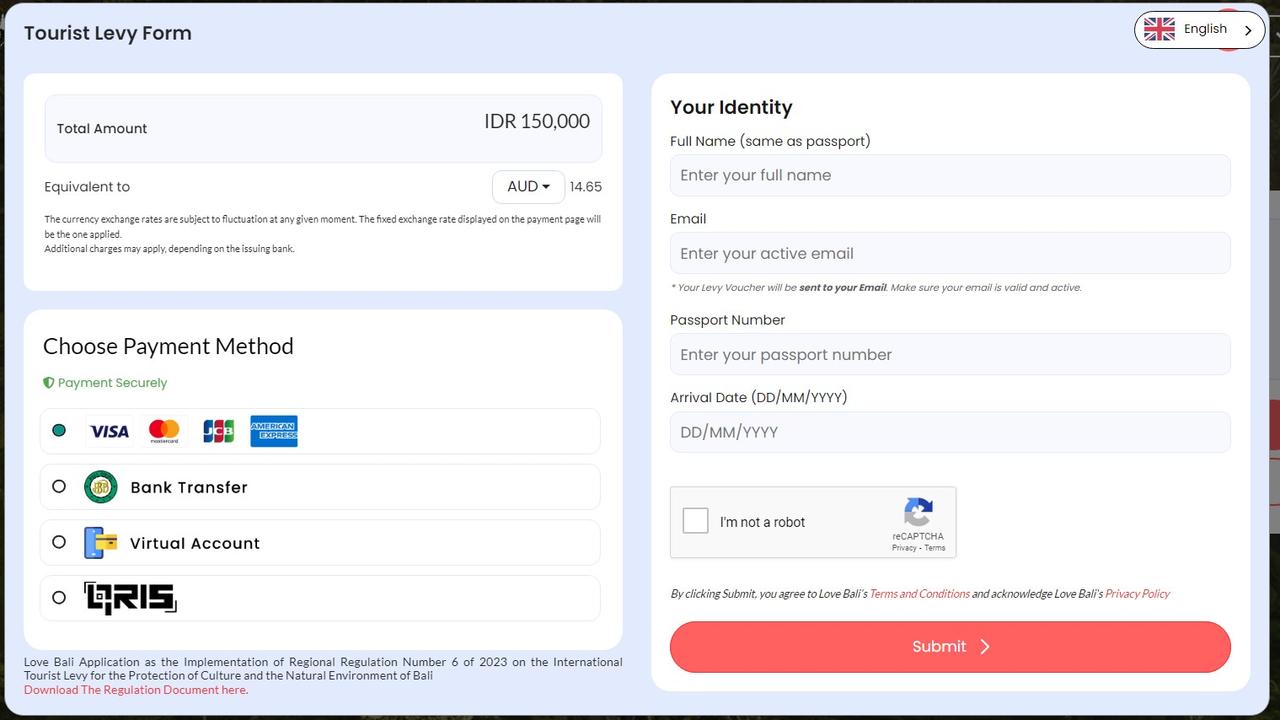
What is the tourist levy for?
The tourist levy is promoted as a way to protect Bali’s culture and natural environment.
“This money will be used in our efforts to establish sustainable tourism,” Indonesia’s Deputy Tourism Minister Ni Made Ayu Marthini told news.com.au when she visited Melbourne last October.
“Primarily, these funds will be used to improve waste management, preserve cultural sites and the local environment.”
The government’s Love Bali website added that it will help improve the quality of services, the safety, and comfort of tourists, by developing integrated land, sea and air infrastructure.
The tourist levy is just one of a series of measures introduced in Bali in the last year to crackdown on mass tourism.
An official tourist dos and don’ts list was released, a hotline was established for anyone to dob in misbehaving travellers, and a special task force was set up to monitor foreigners’ activities.
Indonesia has pleaded with Australian tourists to not only respect local customs but explore more of the country beyond Bali.
The Australian government has also urged travellers to listen to Indonesia’s pleas to behave.

Do I need to pay the tourist levy again if I leave Bali and come back?
There has been some confusion about whether travellers will need to pay the fee twice if they visit nearby islands, like Lombok and the Gili Islands, and then return to Bali in the same holiday.
Indonesia’s Tourism Minister Sandiaga Uno confirmed to news.com.au the tourist levy would only need to be paid once by foreign visitors during a trip to Indonesia.
“You could fly to Bali, pay the fee, visit Jakarta [the country’s capital] and then return to Bali and not have to pay again,” he said. “However if you were to go from Bali to Bangkok [Thailand] and then back to Bali, you would need to pay again.”
Who is exempt from the tourist levy?
Foreigners who have the following visas can apply for an exemption via the same website and app.
They must do so at least one month before arriving in Bali or they will have to pay the tourist levy.
• Diplomatic visas and official visas
• Temporary Stay Permit Cards (KITAS) or Permanent Stay Permit Cards (KITAP)
• Family unification visas
• Golden visas
More Coverage

• Student visas
• Holders of other visa types issued by Immigration, excluding those intended for tourist destinations
Crew of conveyances are also exempt and do not need to submit an application for exemption.
This Aussie traveller made a mistake in Bali that saw her fined $500 – but it could have been a lot worse.
The managers of a renowned Bali tourist attraction have made a major call on the site’s mischievous resident long-tailed monkeys.
From its stunning natural beauty and affordability it’s no wonder why Aussies flock to the island – and now officials want to manage it differently.

- Travel Style

- Family Trips

- Couples & Friends

- Expeditions & Off Beaten Trips

- Adventure & Sport

- Shared Trips & Join Our Groups

- Offers & Last Minutes Deals

- Interest & Activities

- Photography

- TOUR SEARCH
- POPULAR TOURS
- RECOMMENDED TOURS
- BOOK FLIGHTS, FAST BOATS, TRANSFERS
- TAILOR-MADE TOUR
- TRAVEL BLOG
- INDONESIA TRAVEL GUIDE
- MICE TOURISM

- LARGE GROUPS & SPECIAL EVENTS

- TRAVEL AGENCIES - B2B

- Tour Search
- Tailor-Made Tour
- Large groups & Special events
- Travel Agencies – b2b

Bali Introduces Tourist Tax From February 14th 2024
As of February 14, 2024, a new initiative called the Bali Levy ( known as the New Bali Tourist Tax) awaits all international tourists. For a small investment of IDR 150,000 (USD 10), this tax supports Bali’s unique cultural heritage and enhances the island’s commitment to sustainable tourism. Welcome to the Island of Gods! Bali, the Last Paradise, beckons you with open arms, and there’s something new you should know about the Bali Tourist Tax before you embark on this enchanting journey.
You might also be interested in: New Online Tourist Visa to travel to Indonesia (eVOA) and 30-day Online extension + Online Customs Declaration
Why a Bali Tourist Tax?
Bali, with its rich customs, traditions, arts, and local wisdom, is a cultural gem that we all cherish. To safeguard this natural beauty and ensure sustainable tourism, the Bali Provincial government has introduced the International Tourism Tax.
This initiative, effective from the 14th of February 2024 , asks international tourists to contribute a one-time fee of IDR 150,000 (USD 10) . Whether arriving directly from another country to Bali or from other provinces within Indonesia, this payment is applicable for a one-time fee covering the entire duration of the tourist’s stay in Indonesia.
This small investment goes a long way in preserving Bali’s unique cultural heritage while supporting the island’s commitment to sustainable tourism.
Unlocking Benefits Through Bali Tourist Tax (Bali Levy)
Wondering how your contribution makes a difference? Here’s a glimpse into the benefits you help unlock through the Bali Tourist Tax:
- Cultural-Based Tourism Management: Your levy supports the implementation of Bali tourism management rooted in culture. This ensures a high-quality and dignified experience for every traveller.
- Well-Managed Cultural Heritage: Custom management, traditions, art culture, and local wisdom. All seamlessly woven together, preserving Bali’s spiritual aura and providing a rich cultural tapestry for you to explore.
- Clean and Sustainable Environment: Your Bali Levy actively contributes to a cleaner, more sustainable natural environment. From immaculate beaches to lush greenery, you’ll witness the positive impact of your contribution.
- Cleanliness, Orderliness, Convenience, and Safety: Infrastructure and public spaces receive a boost, making your exploration of Bali not just awe-inspiring but also safe and convenient.
- Quality Infrastructure and Transportation: Imagine smooth, integrated land, sea, and air infrastructure enhancing your journey through Bali. Your contribution elevates the overall quality of services, making your adventure seamless and enjoyable.
- Disaster Management Services: Bali becomes more resilient, thanks to improved disaster management services funded by your Bali Levy. Your safety is a priority, ensuring a worry-free exploration of this paradise.

Enhancing Bali’s nature, culture and overall quality of service
The Bali Levy initiative is more than just a tax. It’s a commitment to making Bali an even more extraordinary destination. The Bali Provincial government, guided by regulations such as Bali Province Regulation Number 6 of 2023, envisions progressive efforts and innovations to enhance Bali’s nature, culture, and overall quality of service.
By contributing to the Bali Tourist Tax, you are not just a tourist; you become a guardian of Bali’s cultural and natural treasures.
The Fun Side of Responsibility with Bali Tourist Tax
In 2024, the main priority fueled by your Bali Levy is water management, a commitment to comprehensively and sustainably manage Bali’s natural environment. Picture this: strolling through rice terraces, experiencing vibrant ceremonies, and savoring local delicacies, all made better knowing you’re part of a movement to preserve Bali’s magic. Your contribution helps improve infrastructure, ensuring a seamless blend of land, sea, and air connectivity for an enhanced Bali experience.
By channelling funds into water management, your Bali Levy becomes a catalyst for an everlasting natural sanctuary.
How and where to pay the Bali Tourist Tax?
1) Tourists are encouraged to make the payment through the Love Bali website or via the application LoveBali via Google Play and via App Store before arriving in Bali.
2) Select your preferred currency for payment and click on the “ Pay Tourist Levy ” option.
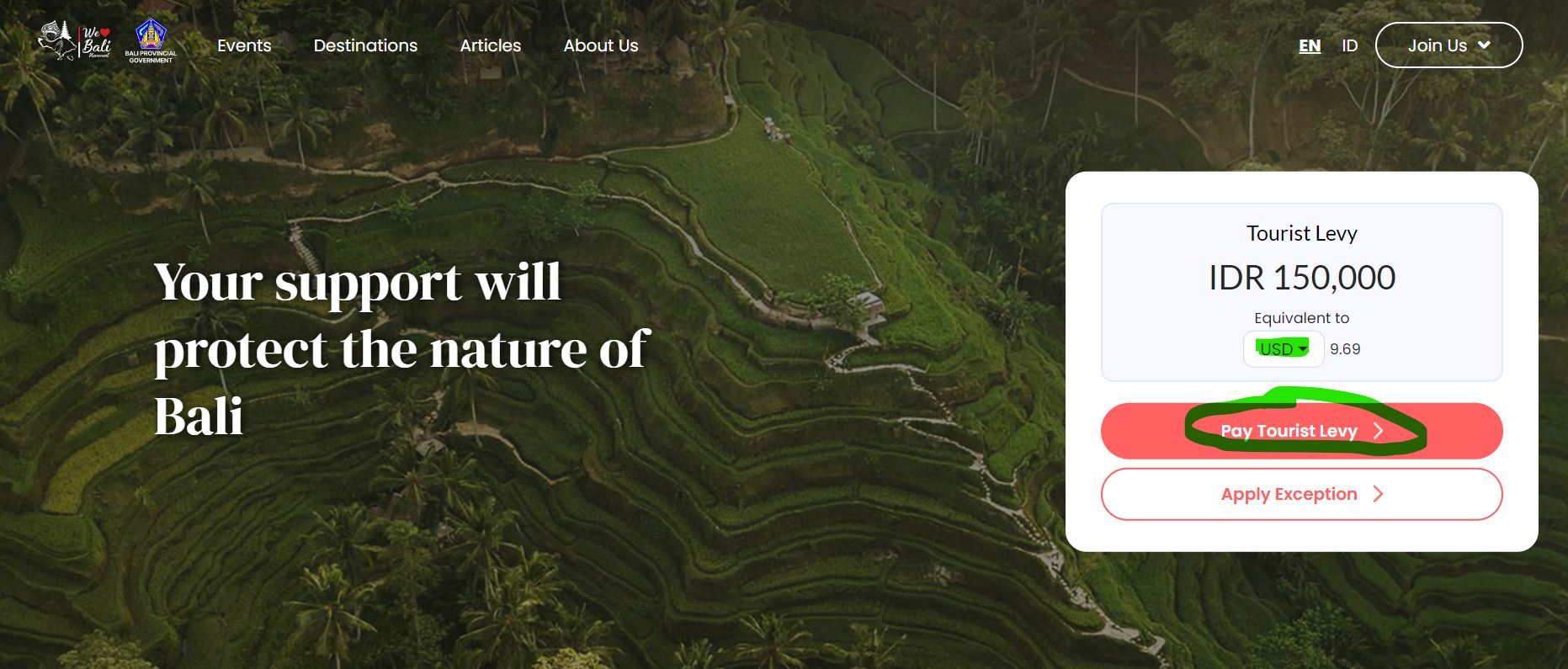
3) Enter your details: Input your passport number, full name, email address, and arrival date. Afterward, choose your preferred payment method.
4) The process is simple, and your Levy Voucher will be promptly sent to the email address you provided.
5) Keep that voucher on your smartphone, as it’ll be your golden ticket at checkpoints in Bali Airport and sea ports. Consider it your backstage pass to the wonders awaiting you in Bali!
Who Gets a Free Pass for Bali Tourist Tax?
With certain visa categories you do not have to contribute to the Bali Tourist Tax. Diplomatic and official visa holders, conveyance crew, KITAS and KITAP holders, family unification visas, golden and student visa holders, and specific non-tourist visa holders can enjoy the beauty of Bali without the levy.
For an exception to the New Bali Tourist Tax, please visit the Love Bali website . Choose the “ Apply Exception ” option and proceed by following the provided instructions.
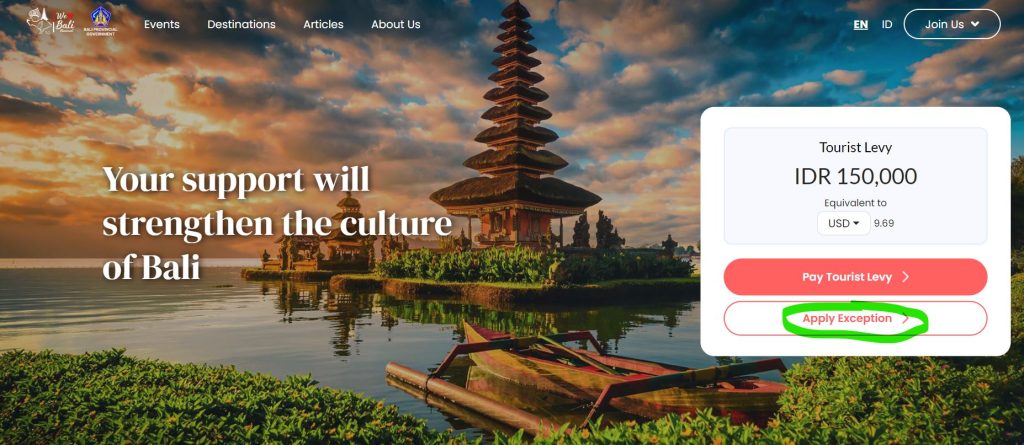
Just remember, if you fall into one of these categories, submit your exemption application one month before your arrival to Bali.
So, as you embark on your Bali adventure, remember that the Bali Levy is your passport to not just a vacation but a transformative experience. You’re not merely a traveler; you’re an integral part of Bali’s journey toward a future where culture thrives, nature flourishes, and every visitor contributes to the island’s enduring allure.
Pack your bags, embrace the Bali Levy, and let the magic of Bali unfold with every step!
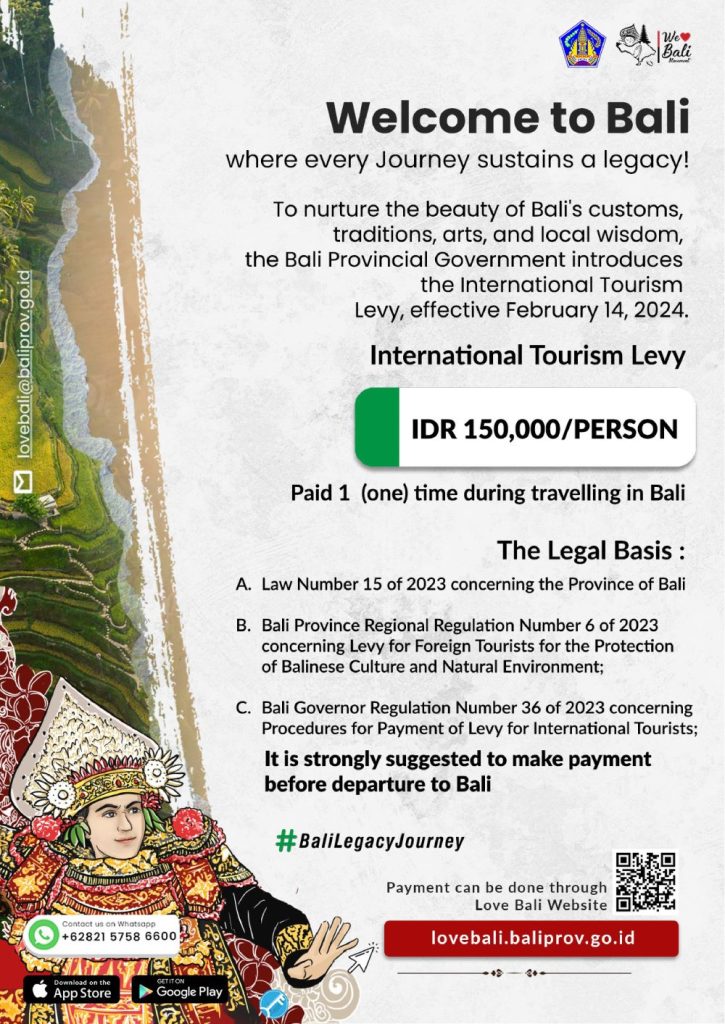
Ready to visit Bali? Don’t forget to book your tours with us!
FEATURED ARTICLES

How to Register Your Mobile Phone IMEI Number in Indonesia (Update 2024)

All About Bornean Orangutans and Jungle Boat Trips

Discover SUMBA ISLAND & its incredible PASOLA FESTIVAL

Learn Bahasa Indonesia: LESSON 1 – INTRODUCTION

Traditional Indonesian drink: JAMU

Indonesia Travel Guide: All the information you would like to know before travel to Indonesia

Discover Indonesia’s Traditional Arts: Batik & Wayang

Swimming with Whale Sharks: Where to find these Giants in Indonesia

A Guide to the Best Restaurants, Bars, and Beach Clubs in Bali
Recommended trips.

Borneo – Yogyakarta – Bali – Komodo (14D/13N)
4 nights in Ubud 3D2N Yogyakarta Tour with Private Guide 3D2N Borneo Orangutan Tour based with private klotok Travel with transfers included Island of the Gods

Bali Ubud Borneo Seraya Labuan Bajo (12D/11N)
5 nights in Ubud 3 Nights stay in Seraya 3D2N Borneo Orangutan Tour based with private klotok Travel with transfers included Island of the Gods

Borneo Bali Nusa Penida and Gili (17D/16N)
5 nights in Ubud 3 Nights hotel stay in Nusa Penida 3D2N Borneo Orangutan Tour based with private klotok Travel with transfers included Island of the Gods

Borneo Bali Yogyakarta Karimunjawa (13D/12N)
5 nights in Ubud 2 Days Bali Tour with Private Guide 3D2N Borneo Orangutan Tour based with private klotok Travel with transfers included Island of the Gods

Bali Ubud and Nusa Dua (9D/8N)
6 nights in Ubud 2 nights in Nusa Dua Travel with transfers included Island of the Gods

Bali Island Tour: Lovina Dolphins, Kintamani Highlands & Ubud (5D/4N)
Different hotels each night Lovina dolphins Kintamani Tenganan Village Besakih Mother Temple
Destinations

Email address:
Article author

SHARE THE POST WITH FRIENDS
Leave a Reply Cancel Reply
Save my name, email, and website in this browser for the next time I comment.
¡Darme de alta en la newsletter!
- Search Please fill out this field.
- Manage Your Subscription
- Give a Gift Subscription
- Newsletters
- Sweepstakes
Bali Just Implemented a Tourist Tax — What to Know
The new tax, which travelers can pay online on the Love Bali site before going, will cost 150,000 Rupiah ($9.61).
:max_bytes(150000):strip_icc():format(webp)/alison-fox-author-pic-15f25761041b477aaf424ceca6618580.jpg)
Klaus Vedfelt/Getty Images
Visiting the popular Indonesian destination of Bali just got more expensive thanks to a tourist tax that went into effect on Wednesday.
The new tax, which travelers can pay online on the Love Bali site before going, will cost 150,000 Rupiah ($9.61), according to officials . Travelers who don’t pay in advance can pay at a cashless bank counter upon arrival at the airport or harbor.
“Hopefully this can trigger the revival of the tourism industry and the tourism and creative activities involved,” officials said in a statement when the tax was first announced, adding the tax would help “make tourism more maintained and sustainable.”
Officials said the fee will be used for conservation efforts, to protect the destination’s culture and tradition, to implement “quality tourism governance,” and “build quality public transportation facilities and infrastructure.”
Travelers who pay the tax online will be asked to enter a credit card or their bank information along with their passport number and arrival date. There are several exemptions to the tax, including for those with diplomatic or official visas, student visa holders, and those with temporary or permanent stay permits.
Bali isn’t alone in implementing a tourist tax. This year, Venice plans to implement a fee for day trippers in addition to the tax it already charges overnight guests, and Iceland has said it will similarly start charging travelers in an effort to support its climate and sustainability goals. Cities like Paris and Amsterdam , which already have taxes in place, have also raised them.
While it may be more expensive to visit Bali , the tax comes during the island’s low season , which typically lasts from January to March. That means travelers who visit now will have the benefit of fewer crowds and lower prices overall, but will have to contend with some humid and rainy weather.
Related Articles

Bali's New Tourism Tax: Your Ultimate Guide for Your Next Trip

Bali’s new tourism tax commenced 14th February 2024
Table of Contents Show
Bali's Tourism Tax: What You Need To Know Before Your Next Trip
Bali has introduced a tourism tax for tourists coming to visit the island.
This tax is in addition to visa fees , such as the Visa On Arrival that most tourists obtain for their holiday.
I know this tax will add extra costs to a family holiday. However, I'm pleased that the funds from Bali's tourist tax go to protect and keep alive the Balinese culture we come to Bali to experience.
The Bali government promises that every dollar helps fix temples, support traditional dances, and teach the stories that make this place unique.
What You Need To Know
Starting February 14, 2024, all tourists must pay a new Bali tax of IDR 150,000 (approximately US$10) per person, which applies to children as well as adults .
The tourism tax does not apply to locals, permanent residents, Golden Visa holders, or ASEAN members.
You can pay the tax online before you arrive or in person at places like Ngurah Rai Airport using QRIS. The government says this will reduce queues, but I will be interested to see if those who pay in advance are fast-tracked through or not.
You can pay the tax online up to two months in advance of your arrival date . My recommendation is to pay around 15 days before you arrive (not more) just to be safe because the tax and its systems are new.
The extra fee is claimed to improve the tourist experience by funding eco-friendly activities and cultural learning.
Update: Online system experiencing intermittent problems
At the end of the first week of the new tax being introduced, reports are emerging of travelers having difficulty with the online payment facility.
If you have difficulty paying at the Bali tax official online payment facility don’t be too worried. You can pay on arrival at Bali’s Ngurah Rai International Airport.
There have been reports of queues, but Bali government officials are in talks with airport officials to have more counters set up and I expect that will happen in the next few days.
All new systems have teething problems that are hard to simulate in the lead-up to a launch.
75,000+ tourists have paid the tax on or before arrival
So far, after 10 days of the introduction of the tax, around 76,000 tourists have paid the new tax, generating over IDR 11 billion in revenue, and that has been a good stress-test for the system and highlighted areas for improvement.

Bali’s new tourism tax official flyer (front)
What is this new tax for?
The money from this tax will help keep Bali's culture alive , protect nature, and make sure visitors have a great experience.
Bali wants to take care of its beautiful places and traditions while making sure tourists have an awesome time without harming the environment.

Bali’s new tourism tax flyer (back)
Purpose of Bali's Tourism Tax
The purpose of Bali's tourism tax is threefold:
To preserve the cultural heritage of the island;
To protect its natural environment ; and
To enhance the overall tourist experience .
This tax seeks to support sustainable tourism practices that benefit both visitors and local communities.
Preservation of Heritage
It feels good to know a small tax from my visit contributes directly to something meaningful.
Bali bursts with amazing ceremonies like Melasti and Nyepi—times when everyone comes together to celebrate our human spirit. The tax ensures these traditions stay strong for future generations.
I see it as giving back to a land that gives us, as visitors, so much beauty.
It’s a way we can help maintain what we come here to experience.
Nature Conservation
Just like we work to keep our cultural landmarks alive, protecting Bali's natural spaces is key.
This new tourism tax helps Bali do just that. Bali’s beaches, rainforests, and coral reefs are home to amazing wildlife and plants.
By paying the tourism tax, visitors support efforts to take care of these places for generations to come.
Money from the tax goes towards cleaning up trash and keeping Bali beautiful.
The tax also focuses on protecting animals' homes and making sure nature stays balanced. Everyone who enjoys Bali helps in this mission by contributing through tax.
The tax will hopefully make a big difference in maintaining Bali’s environment as a stunning backdrop for our memories.
Enhancement of Tourist Experiences
Enhancement of tourist experiences in Bali is a priority for Love Bali, aiming to offer visitors a deep and authentic connection with the island's rich culture and natural beauty.
By investing in sustainable tourism initiatives , such as preserving ancient temples , organizing traditional performances , and maintaining pristine beaches , tourists can immerse themselves in the true essence of Bali.
Furthermore, efforts are underway to provide educational opportunities for visitors to learn about Balinese traditions and engage in meaningful interactions with local communities.
The introduction of eco-friendly tours and activities also allows tourists to explore Bali's stunning landscapes while minimizing their environmental impact.
From guided treks through lush rice terraces to snorkeling excursions along vibrant coral reefs – every experience is designed not only for enjoyment but also for contributing positively to the local environment and society.
The new tourism tax came into effect on 14th February 2024 . It's IDR150,000 per person - including children. The levy aims to preserve Bali's culture and nature.
TIP : You can handle the payment online before your plane lands using the Love Bali website or app ; they'll give you a QR code to show when you arrive.
1. What is the new Bali tourist tax?
The Bali tourist tax is a fee that visitors pay to support environmental protection and cultural preservation in places like Bali, Nusa Penida, and the Gilis.
2. How much will I be charged for this tax on my trip to Bali?
Visitors to Bali, Indonesia, will see a small payment of Rp150,000 (approximately US$10). This tourism tax helps manage mass tourism's impact on Bali.
3. How Far in advance can I pay the new Bali tourist tax
Currently, the online payment facility only allows payment for arrival dates up to two months in advance. Because this tax and the systems that run it are very new, I would advise against paying more than 15 days in advance, just to be safe. As the new tax settles in, I might get more confident but for now, I think that is safest.
4. Why did Bali decide to introduce a tourist tax?
Bali introduced this tax to promote and fund initiatives that aim to foster responsible tourism that respects cohabitation between travelers and nature.
5. Will ASEAN country citizens have different taxes compared to other tourists?
Travelers from ASEAN countries are exempt from the tourism tax.
6. If I book through Airbnb in Singapore but travel to Bali, am I still subject to this taxation?
Certainly—no matter where or how you book your stay and flights, the new tax applies to all visitors, with only a few exceptions.
Editorial Team Hi, I’m Simon St John , Baligram’s writer. I am a published Author of travel guide books and a Travel Writer. I have visited Bali more than 35 times over a 25-year period. I share my passion for Bali’s nature, culture, and adventure in this travel guide. I welcome your feedback and ideas! Read about Simon and about Baligram .
Has Bali banned unmarried sex? Can unhitched tourists still make love?

Bali Travel Blog | Villa Finder
Everything you need to know about Bali’s Tourism Tax 2024
Bali’s tourism tax comes into effect on the 14th of February 2024, aimed at preserving its natural beauty and cultural heritage. Tourists planning to visit Bali need to mark a crucial update in their calendars and travel admin.
Here’s everything you need to know about Bali’s tourism tax 2024.
Table of Contents
Understanding The New Bali Tourism Tax
The Bali provincial government has announced a new tourism tax of IDR 150,000 per visitor, applicable to international tourists entering the island. The tourism tax policy is being introduced as part of a bigger mission by the Provincial Government to promote sustainable and dignified tourism in Bali.
The revenue generated from this tax will be directed toward funding environmental initiatives, cultural preservation projects, and infrastructure improvements. This will enhance the visitor experience without compromising the island’s integrity.
How Will It Affect Your Trip?
For travelers, the new tourism tax means planning for an additional expense of IDR 150,000 (about USD10) upon entry into Bali. Every tourist needs to pay this, children are not exempted.
The new tourism tax applies to those visiting mainland Bali as well as its surrounding islands such as Nusa Penida, Nusa Lembongan, and Nusa Ceningan.
The tourism tax is collected per entry, meaning if you leave Bali and travel to another part of Indonesia, you will need to pay the levy again upon your return to Bali.
Bali tourism chief Tjok Bagus Pemayun first announced the start date of the levy in September 2023.
He has since confirmed that the funds will be managed by the Bali Provincial Government, the Bali Tourism Office, and the BPKAD.
Bali is not alone in its pursuit of sustainable tourism. Other destinations, such as Venice and Bhutan, have implemented similar taxes to balance the impacts of tourism with environmental and cultural preservation.
How Do I Pay The Bali Tourism Tax?
According to The Bali Sun , he assured the payment for the levy can be processed quickly at immigration counters.
However, according to a recent official notice, tourists are encouraged to pay the tax via the Love Bali website or app before leaving for Bali.
Whether you’re drawn to Bali for its restaurant scene, serene beaches, vibrant culture, or spiritual ambiance, your visit now carries an added layer of purpose. As we look towards a more sustainable future, Bali’s new tourism tax is a step in the right direction, ensuring that the island’s magic is preserved for generations to come.
Related articles:
- Bali’s e-Visa on Arrival: A Simple Guide
- The Ultimate Guide to Find the Right Bali Villas
- Guide to Travel to Bali with a Baby
Related Articles
Driving a motorbike in bali: the do’s and don’ts, how to plan your bali wedding in a villa, go green: vegetarian eats in ubud.
- Hotline: +6221-50919500
- Contact Our Sales Team: +62 812 9566 5565
- Email: [email protected]

Blog – InvestinAsia
The Market Entry Experts Indonesia
Bali Tourist Tax Regulations 2024: Complete Guide
- InvestinAsia Team
- March 25, 2024

In February 2024, Bali introduced new regulations regarding tourist taxes, aiming to support the sustainability of its tourism industry. These updates are essential for anyone planning to visit Bali to ensure a smooth and hassle-free experience.
Also read: Bali Travel Guide: Complete Tips for Tourists
Who Needs to Pay the Bali Tourist Tax?
The Bali Tourist Tax applies to international travelers visiting Bali, including foreigners arriving from outside Indonesia and those coming from other provinces within Indonesia.
Also read: New Rules and Restrictions for Foreign Tourists in Bali 2024
How Much Does the Bali Tourist Tax Cost?

The Bali Tourist Tax amounts to IDR 150,000 per person (approximately USD 10 or AUD 15), irrespective of the traveler’s age. Additionally, there’s a surcharge of Rp 4,500 for online payments.
Also read: Bali Entry Requirements: The Complete Guide
How to Pay the Bali Tourist Tax?
Here’s a step-by-step guide on how to pay the Bali Tourism Levy:
- Visit lovebali.baliprov.go.id or download the Love Bali App from the Google Play Store or Apple App Store.
- Enter your personal details, including passport number, name, email address, and arrival date.
- Select the payment method you prefer from the options provided.
- Complete the payment of IDR 150,000 per person for the Bali Tourism Tax.
- Upon successful payment, you’ll receive a levy voucher in the form of a QR code, which will also be sent to your
- email. Make sure that the provided email address is valid and active.
- The officer will scan the QR code upon your arrival at the Bali airport.
Also read: Do You Need to be Vaccinated to Go to Bali?
Who is exempted from paying the Bali Tourist Tax?
- Holders of Diplomatic Visas and Official Visas
- Crew Members of Conveyances
- KITAS & KITAP Holders (Holders of Temporary and permanent stay permits)
- Family unification visa holders
- Student Visa Holders
- Golden Visa Holders
- Holders of any other Visa issued by the immigration office, provided it does not have the travel purpose of tourism.
- Travelers with visas issued for purposes other than tourism will be exempt from the tax.
Also read: 25 Things to Do in Bali: Best Activities for Tourists
The Use of the Bali Tourist Tax

Preserving Heritage
The Bali Tourist Tax is utilized to safeguard heritage, including the protection of Balinese customs, traditions, arts, and local wisdom. It ensures the cultural preservation of the island.
Nurturing Nature
Payments of this levy contribute to preserving Bali’s unique culture and natural environment, enhancing the beauty of destinations within Bali.
Elevating the Tourist Experience
Preservation of heritage and nature improves the quality of tourism services and management in Bali, providing tourists with safer and more enjoyable experiences.
That’s all about the Bali tourist tax regulations. If you want a simpler tourist tax arrangement, you can rely on Bali Tax Service from InvestinAsia. Our professional team can also assist you in handling documents and permits such as Bali tourist visas and KITAP/Permanent Stay Permit .
FAQS about Bali Tourist Tax Regulation
If I’m traveling to Indonesia but not to Bali, do I still need to pay the tourist tax?
No, you are not required to pay the tax if you are traveling to destinations within Indonesia other than Bali. The tourist tax specifically applies to visitors to Bali and is not applicable to other parts of Indonesia.
If I return to Bali after visiting other destinations like the Gilis, do I need to pay the tax again?
No, according to the Bali administration, the tourist tax is paid only once during travel within Bali. Therefore, if you have already paid the tax and are reentering Bali after visiting other destinations within Bali, you do not need to pay it again.

if you are ready to start your life in indonesia or to think of discusing other options.

Talk to Our Consultants
Related Posts
Bali Property Tax: 2024 Complete Guide
Indonesia Labour Law & Employment Regulations: Complete Guide
PMA (Foreign Company) Taxation in Indonesia: Complete Guide
Indonesia Tax Rate: An Updated Guide
Bali’s new tourist tax launches — here’s how to pay it

From Feb. 14, foreign travelers visiting Bali in Indonesia will be required to pay a new tourist tax upon entry or before visiting the region.
The fee costs 150,000 rupiahs (around $9.50) and is in addition to any other visa fees. The tax aims to combat overtourism on the popular island.
Although the fee will not currently be enforced in other parts of Indonesia, travelers must pay it during each visit to Bali. This includes leaving Bali to visit another Indonesian island and returning during the same trip.
Related: 15 dream-worthy Bali hotels to book now
While the fee will apply to visiting tourists — including children — international travelers who have Kartu Izin Tinggal Tetap (Indonesia's permanent stay permit card); family unification, golden or student visas; or other specific non-tourist visas will be exempt from paying the tax.
According to officials, the tax will fund tourism management and help maintain Balinese culture. It will also be used for environmental cleanup efforts and disaster management.
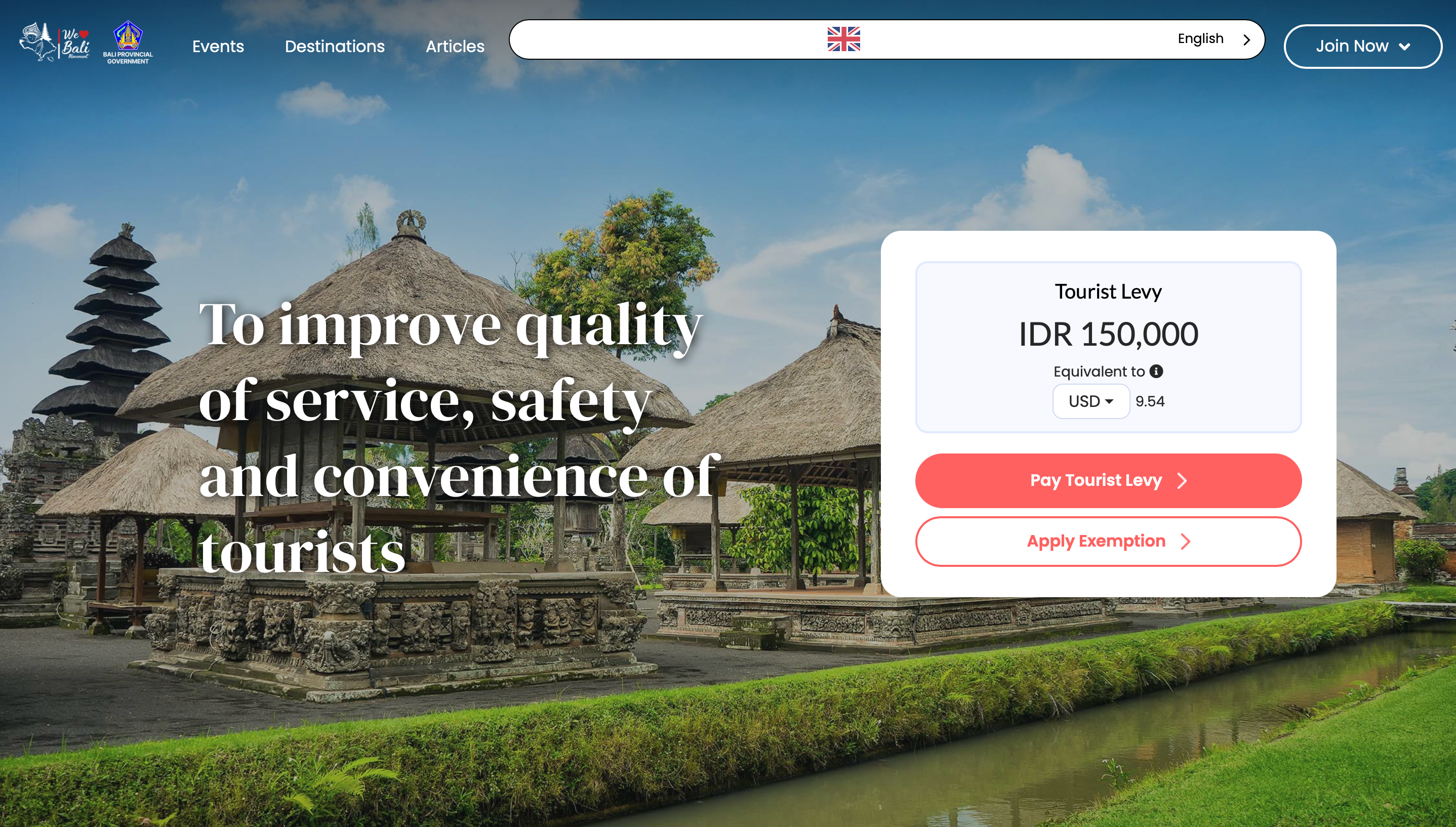
How to pay the new Bali tourist tax in advance of your trip
To pay the tax, you have two options.
Desktop users can visit the Love Bali website for additional information about the charge and payment options. Mobile users can also download the Love Bali app ( IOS / Android ) to learn more about the tax.
Both options will provide several ways to pay the tax, including with credit cards like Visa, Mastercard and American Express, before confirming your details (name, email, passport number and arrival date).
From there, you should be able to process your payment, which will be confirmed by email.
Bottom line
Bali launched a new tourist tax for international travelers that's now in effect. The fee must be paid every time you visit Bali and will cost around $9.50. You can find out more information at the Love Bali website .
Related reading:
- Key travel tips you need to know — whether you're a first-time or frequent traveler
- Best travel credit cards
- Where to go in 2024: The 16 best places to travel
- 6 real-life strategies you can use when your flight is canceled or delayed
- 8 of the best credit cards for general travel purchases
- 13 must-have items the TPG team can't travel without
- Destinations
Explainer: Everything you need to know about Bali's new tourist tax
By Sarah Swain | 3 months ago
It remains a holiday hotspot for Aussies - but Bali is now slapping travellers with a $15 fee.
The Indonesian province's new "tourist tax" will see it make millions a year from visitors .
It says the money- which will add up to millions each year - will be spent on environmental and cultural projects.
Here's everything you need to know before going.
READ MORE: Nyepi, Balinese New Year explained

What is the arrival tax in Bali 2024?
The new arrival tax, known as the tourist levy can either be paid at I Gusti Ngurah Rai International Airport when you arrive or online here before you go.
It costs IDR 150,000, which is around $15.
You can pay by credit card, and must share your name, email address and passport details when you apply on the website.
There are also gates to pay the levy when you arrive in Bali.
The government said it has more than 20 officers to handle queues.
READ MORE: Simple call which cured Aussies' fear of flying

But with the airport usually packed with people, it's likely getting it ahead of time and taking proof is the best thing to do.
The Bali government said the money is for "a form of support that aims to protect the customs, traditions, arts and culture, and local wisdom of the Balinese people."
"Efforts and innovations will continue to be made for maintenance the culture and the natural environment in Bali," it said.
"There will also continue to be an improvement in the quality of services."
It started just last month.
READ MORE: Tropical destinations on offer in Virgin Australia's summer sale

Do Aussies need a visa for Bali?
Australians do need a visa to go on holiday in Bali. This is separate from the tourist levy.
It is called a B1 visa and lasts for 30 days.
It can be extended for another 30 days.
READ MORE: Are luggage trackers such as Apple AirTags allowed in your bags?
It costs just under $50 (Rp500.000).
You can get it on arrival.
You can also apply online for the e VOA (visa on arrival) 14 days from your trip,

But don't leave it too late.
"You are advised to create an e-VOA request at least 48 hours before your departure, otherwise you might not receive it in time. The Visa is not issued instantly!" the official Bali.com page said.
You can apply for the visa on the Indonesian website.
You must upload a passport photo and your passport, pus pay the fee.
EXPLAINER: Everything you need to know abut travel insurance
Property News: This property in Sydney's Leichhardt appears to be a tiny house from street view with its narrow design, but it's actually a six-bedroom home.

Sylvia Jeffreys shares family trip to her childhood happy place

The top ten destinations Australians are flying to

The 'magic' of Brisbane extends beyond the footy field
Bali Tourist Tax
A Traveler's Guide to Bali's New Tourist Tax

Bali Tourist Tax 2024.
Planning a trip to Bali means you get the chance to experience its breathtaking landscapes, diverse cultural heritage, and warm hospitality.
However, with the introduction of the Bali Tourist Tax in 2024, it’s important to know this information before your next trip.
Here’s a straightforward guide to help you navigate the Bali Tourist Tax and make your trip hassle-free and enjoyable.
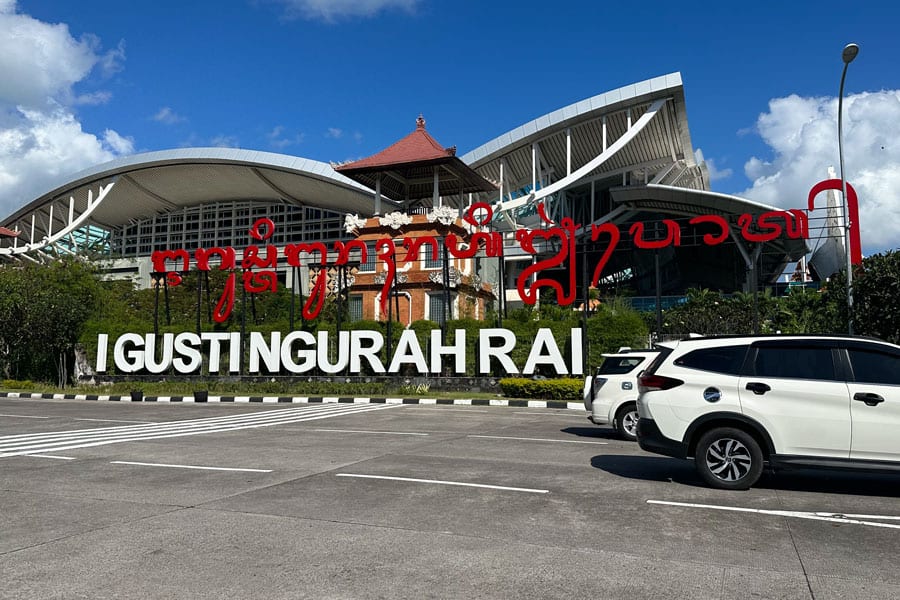
Understanding the Bali Tourist Tax
Bali is a popular tourist destination that attracts millions of visitors every year. However, this influx of tourists can negatively impact the island’s cultural and natural assets.
The government has implemented a tourist tax to mitigate this impact and preserve Bali’s unique cultural heritage and natural beauty.
This tax funds initiatives supporting sustainable tourism practices and protecting Bali’s environment and cultural treasures. By paying this tax, tourists can contribute to preserving Bali’s rich cultural heritage and stunning natural landscapes, ensuring that future generations can continue to enjoy the island’s beauty and charm.
Tax Essentials
- Fee: Each visitor is taxed 150,000 Indonesian Rupiah (around $10 USD).
- Start Date: The tax was implemented on February 14, 2024.
- Payment: The tax can be conveniently paid online through the Love Bali website or app before arrival, streamlining your entrance to Bali.

Paying the Bali Tourism Levy
- Access Love Bali: Utilize the official Love Bali online platform or mobile app well before your trip.
- Submit Personal Information: Input your details, passport number, name, email, and arrival date.
- Payment Selection: Choose your preferred payment method, which includes options like credit card and bank transfer.
- Voucher Receipt: Upon completing the payment, a voucher will be emailed to you for airport verification upon arrival.
- At the Airport: Please ensure you have your levy voucher. You will be required to present it for scanning at the designated checkpoints.

Visa to Bali
Step-by-Step Bali Visa Guide: Navigating VOA, e-VOA & B211A with Ease
Travel Requirements
Read our guide on Bali's tourist tax and how it supports Bali Island
Vacation to Bali
Discover Bali's Best: Tropilogy's Guide to Beaches, Dining & Must-Visits
Bali Experiences
Facts about galungan and kuningan in bali.

Fun Playground in Bali for Kids to Play

Best Dive Sites in Nusa Lembongan Bali to Explore

Five Bali’s Top Diving Sites

Unique Bali Traditions and Rituals that Will Surprise You

The information contained in this document/website is for general informational purposes only. While we make every effort to ensure the accuracy and reliability of the information presented, we cannot guarantee its completeness, timeliness, or applicability.
Any reliance you place on such information is strictly at your own risk. We disclaim all liability for damages of any kind arising from the use of this information.
Bali is trying to crack down on bad tourists. Will it help?
The government has taken new measures to discourage disrespectful behavior from hard-partying tourists

Niluh Djelantik has been on vacation abroad, but the Balinese influencer is still getting texts from frustrated friends, family and fans back at home. Djelantik has grown a huge social media presence by mediating conflicts between visitors and locals on the island, pro bono. She gets a deluge of messages asking for help whenever a tourist goes off the rails in Bali; recent examples of boorish behavior from foreigners on the Indonesian island include a Danish woman exposing herself from the back of a motorbike, an American man who bashed a police car and an Australian man who spat on someone at a mosque.
“It never ends,” Djelantik said.
But she welcomes the news, even while she’s away. If she’s up to date, “I can do what I can to make the situation better,” she said. If she’s traveling, that could be reposting bad behavior to spread awareness, or sharing information with law enforcement or immigration officials. When she’s at home, she helps in person by facilitating meetings and apologies between offending foreigners and locals.
View this post on Instagram A post shared by Ni Luh Putu Ary Pertami Djelantik (@niluhdjelantik)
The Balinese government is aware of the ongoing frustration on the island and has promised to do more to change its reputation as a cheap party destination and rein in rule-breaking. As of June, Bloomberg reported , Bali has deported 136 misbehaving foreigners this year for issues including indecent exposure, rowdy behavior and disobeying local laws, among others.
And in July, Bali governor Wayan Koster announced a $10 tourist tax that will go into effect mid-2024. The one-time fee will apply to foreign visitors only and be paid electronically. The tax isn’t expected to reduce bad behavior, but rather, Koster said, support infrastructure and environmental projects, the Bangkok Post reported .
It’s also experimenting with new schemes to reduce disruptive behavior from travelers and safeguard local Hindu customs. That includes distributing a list of dos and don’ts to travelers, and announcing a so-called mountain ban that has yet to be enforced.
Sacred mountains attract tourist stunts
Bali’s volcanic mountains are considered sacred to Balinese people, and among the island’s most popular tourist attractions. But they’ve been backdrops for recent stunts, like a foreigner who posted a bottomless photo of himself and was later deported.
During a press briefing on May 31, the governor proposed a ban of activities (with the exception of religious ceremonies) on its 22 mountains, said Febria Diah Retnoningsih, a counselor of social, cultural and information affairs at the Indonesian Embassy in Washington.
Two months since the announcement, however, “it is not clear if this regulation has been implemented yet,” Retnoningsih said in an email.
For now, people are still visiting the mountains, and posting about their hikes on social media , despite the fact that during his announcement, the governor said the ban was “immediate and forever,” said a reporter from the Bali Sun, who spoke on the condition of anonymity to talk freely.
“It’s just that the legislation hasn’t been put through,” the reporter continued. “So nobody’s breaking the law, but nobody’s obeying by the new rules, either.”
Is affordable luxury in Southeast Asia a myth? We went to find out.
The last time Ravindra Singh Shekhawat, general manager for Intrepid Travel’s Bali operations, went to the top of Mount Batur, there were more than 500 visitors and every group had a guide. At the base and close by, locals earn a living selling their goods and running restaurants and hotels. If implemented officially, the ban would impact that entire network, Shekhawat said.
Djelantik is not a supporter of the ban on mountain tourism, feeling that a blanket ban would punish visitors who do follow the rules as well as the local community Shekhawat mentioned. Instead, she’d rather see the government enforce existing rules and punish bad actors accordingly.
“If you had a big rat in your house … you don’t burn down the house,” Djelantik said.
No climbing the holy trees, please
In an attempt to educate foreigners, the government handed out cards to tourists arriving at the airport that explain local etiquette in June, the Jakarta Globe reported , and now exist as QR codes travelers can scan.
The don’ts include eight items, such as: avoiding climbing sacred trees, littering, working or trading illegally, using non-recyclable plastics, taking pictures in “unproper” clothing around sacred places and entering main areas of sacred spaces unless to pray and wearing traditional Balinese clothing (although it’s not allowed for anyone on their period). “All offenses are subject to law or deportation,” the card concludes.
Lael Kassis, vice president of market innovation and development for EF Go Ahead Tours who is launching a Bali itinerary in 2024, said the more informed a traveler is when visiting a new destination, the better, and supports the new cards.
“What Bali is doing is really leaning in to technology to give travelers access to this information — make it easy and transparent,” he said. “The more information travelers have, I think that’s a good thing.”
What is skiplagging? All about the travel hack airlines hate.
Djelantik agrees it’s important to learn Balinese laws and etiquette. She also encourages visitors to consider the rules of their home country, too. If it’s illegal to strip naked for a photo shoot where you’re from, chances are it’s illegal where you’re on vacation or living as a digital nomad .
The spirit of the cards may be noble, but some are skeptical they’ll impact their target audience. A reporter from the Bali Sun, who spoke on the condition of anonymity to talk freely, said the solution seemed like a rushed approach to address public concern. Tourists most likely to cause problems aren’t the kind to read dry educational materials or scan the QR codes, they said.
Wayan Wardika , a sustainability activist and founder of the campground Tegal Dukuh Camp, says more site management could help the issues, like better signage at temples and holy sites, or requirements to go with guides. It needs to be more clear that temples are built not for decoration, but for the community.
“I think what makes Bali stand out is because we live and preserve this cultural heritage of all these holy sites, and lots of tourists take it for granted,” Wardika said. “I didn’t say all — I would say most of the guests and most of the tourists have a high respect for what we are doing.”
Locals pay for cleanup
When outlier tourists strike, particularly at Balinese holy sites, there’s a ripple effect. The community has to take part in a cleansing ceremony to restore harmony.
“It’s a lot of work for local people to maintain the sanctity of the place after these sort of things,” Shekhawat said.
The cost of such ceremonies depends on the severity of the incident.
“In Bali we have three levels of ceremony,” Wardika said. Where an incident falls, Wardika says, is decided by village leaders and residents.
Djelantik arranged a ceremony after the tourist went bottomless on Mount Agung that she says cost about $350. In more extreme cases, like when a German woman walked through a temple naked during a sacred performance in May, a cleansing ceremony could cost more than $1,000, Wardika says.
When a foreigner breaks the rules, the damage is often twofold. Not only have they disrespected the local community, “they don’t want to pay the price,” Wardika said. “We have to pay.”
Want to move to Bali? You’ll need $129K in savings first.
Djelantik, the social media fixer, worries some new efforts like the tourist tax will anger visitors or make them feel unwelcome in Bali. But she says the pushback has nothing to do with tourism on the whole.
“This is not because we hate foreigners or because we are not grateful for having them. … In fact, it’s completely the opposite,” Djelantik said.
“We are truly grateful. We love them,” she continued. “But at the same time, we also, as human beings … we have the full right to stand up for our hometown.”
More travel news
How we travel now: More people are taking booze-free trips — and airlines and hotels are taking note. Some couples are ditching the traditional honeymoon for a “buddymoon” with their pals. Interested? Here are the best tools for making a group trip work.
Bad behavior: Entitled tourists are running amok, defacing the Colosseum , getting rowdy in Bali and messing with wild animals in national parks. Some destinations are fighting back with public awareness campaigns — or just by telling out-of-control visitors to stay away .
Safety concerns: A door blew off an Alaska Airlines Boeing 737 Max 9 jet, leaving passengers traumatized — but without serious injuries. The ordeal led to widespread flight cancellations after the jet was grounded, and some travelers have taken steps to avoid the plane in the future. The incident has also sparked a fresh discussion about whether it’s safe to fly with a baby on your lap .

- [email protected]
- +62 21 300 297 27
- +62 812 9260 0590
- Jakarta Office:
- Creative Office:
- Seminyak Office:
- +62 361 934 8343
- Canggu Office:
- +62 361 939 9406
- Sanur Office:
- +62 361 280 789

Bali Introduces Tourist Tax Effective 14th February 2024: Here’s What You Need to Know
LetsMoveIndonesia
As a world-renowned traveller’s paradise, Bali welcomes millions each year. However, for travellers seeking to venture to the Island of God, there will be another requirement you have to fulfil. In an attempt to enhance sustainability and improve visitor experiences, The Bali Government designed a new tourist levy that will be implemented from 14th February 2024.
If you’re considering a trip to Bali soon, here is what you need to know about the tourist tax!
What is the Tourist Tax in Bali?
A tourist tax is a levy imposed on visitors to a particular city or country, as outlined in Bali Provincial Regulation Number 6 of 2023. It is typically collected through accommodation providers, such as hotels and vacation rentals, and added to the final bill that the tourist pays. The revenue generated from tourist taxes is then used to fund various initiatives, such as:
- Maintaining and improving tourism infrastructure, such as roads, parks, and public transportation.
- Supporting local businesses and cultural attractions.
- Promoting sustainable tourism practices.
- Offsetting the negative impacts of tourism, such as overcrowding and pollution.
How much should I pay for the Tourist Tax in Bali?
The new Tourist Tax in Bali is IDR 150,000 (approximately USD 10) per person for all foreign tourists entering the island. This is a one-time fee that applies to all ages, regardless of nationality.
How to Pay Your Tourist Tax in Bali?
You can pay the tourism tax when visiting Bali using an application called Love Bali or by visiting the website lovebali.baliprov.go.id. Here are the step-by-step instructions you can follow to pay the tourist tax:
- Download the Love Bali application or visit the website lovebali.baliprov.go.id .
- Input personal information including passport number, email, name, and date of arrival. Choose your preferred payment method.
- Receive a Levy Voucher via email.
- Present the Levy Voucher to the immigration officer upon arrival at the gate.
Are there tourists who do not have to pay Tourist Tax in Bali?
There are currently 7 categories of foreign tourists exempt from the new tourism tax, which officially began on February 14, 2024. However, it’s important to note that these exemptions require prior application and approval. Here are the categories:
- Holders of diplomatic and official visas: Individuals travelling on official or diplomatic business are exempt from the tax.
- Crew members on vehicles: This includes air, sea, and land transportation staff working on their designated routes.
- Holders of temporary or permanent stay permit cards (KITAS and KITAP): Foreigners residing in Indonesia with KITAS (temporary) or KITAP (permanent) are exempt.
- Holders of family unification visas: Spouses and dependents of Indonesian citizens holding this visa are exempt.
- Holders of student visas: International students enrolled in accredited Indonesian institutions are exempt.
- Holders of Golden Visas: Individuals holding this specific long-term residence visa for investors are exempt.
- Holders of other business-specific visas: Certain visas tied to specific business activities (e.g., investment, research) may have exemptions, but it’s crucial to confirm with officials.
Remember, even for exempt categories, an application for tourism tax exemption must be submitted online at least one month before entering Bali. The local authority will verify and decide within five working days.
For details and updates, refer to trusted sources like the Bali Governor’s Regulation Number 36 of 2023 on Payment Procedures for Foreign Tourist Levy or visit the Love Bali website, dedicated to foreign nationals to apply for the tourism levy.
Other information related to Bali Tourism and Relocation
Do i still need to apply for a visa to bali if i have already paid for the tourism tax.
Yes, applying for a Visa is still mandatory if you want to visit Bali or other provinces in Indonesia. Paying the tourism tax does not affect your visa requirement.
Do I need to pay the tax again when I leave Bali and re-enter?
Yes, you must re-issue payment if you leave Bali. This means island-hopping enthusiasts who venture out to Lombok or Flores for a day trip or longer will be charged the tax again upon their return to Bali.
Did you find the information about the Bali tourist tax helpful?
Planning a trip to Indonesia can be exciting, but understanding the ins and outs can feel overwhelming. That’s where LetsMoveIndonesia comes in! Visit our website for comprehensive guides on Indonesia relocation, immigration, taxes, and business setup. We go beyond just tourist facts, offering invaluable information for those looking to explore further.
Want to know more about navigating Indonesia’s regulations or relocating to Indonesia entirely? Our experienced consultants are here to guide you through the process, from entry visas to business permits. Let us demystify the paperwork and ease your transition, so you can focus on making the most of your Indonesian adventure. Speak to our consultants through a Free Consultation!
Found this article interesting? Check out our other useful articles about visas here!
Bali Visas – Guide to Bali Visa for UK Citizens
The Indonesia Visa on Arrival 2024 – Everything you need to know now!
LetsMoveIndonesia – 2022 Bali Visas Recap
Jakarta Visas – How to Get a Jakarta Visa on Arrival
Get Your Free Consultation
Interesting news.

Get your Single Entry Business Visa and enter Indonesia

The New E-Visa Everything You Need to Know

How to Set Up a Business in Indonesia

The Investor KITAS in Indonesia – Everything You Need to Know!
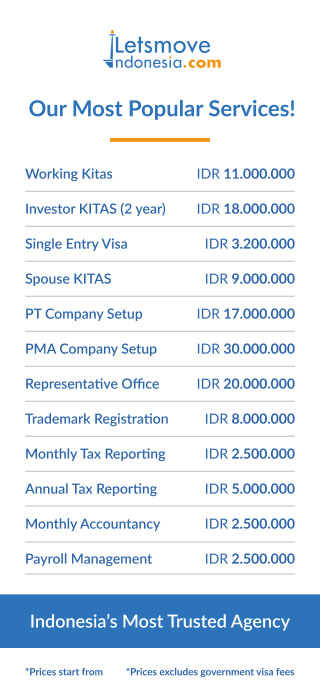
Latest News

Your Guide to Japanese Visas
Japan, with its captivating blend of ancient traditions and modern marvels, is a dream destination for many travellers. From serene temples and bustling cities to breathtaking natural landscapes and unique cultural experiences, Japan has something to offer everyone. However, before you pack your bags and embark on your Japanese adventure, there’s one crucial step: obtaining […]
- Natalia Harfiana

Lets Move Indonesia Proudly Launches Global Visa, Your Gateway to the World!
Having earned the trust of thousands of clients with our premier immigration and legal relocation services for expatriates in Indonesia, Lets Move Indonesia is expanding our commitment to providing comprehensive solutions for your global mobility needs. We are proud to announce the launch of our latest service, Global Visa by Lets Move Indonesia, officially available […]

A Comprehensive Guide to Securing a Visa to the UK
If you’re planning a remarkable journey to the United Kingdom, there’s a crucial aspect to consider before delving into itineraries: comprehending the proper procedures for entering the country. This includes the meticulous process of applying for a visa. Think of it as your official permission slip, a gateway that allows you to legally reside in […]

Understanding the Common Visa Types Around The World and Their Functions Before Travelling
In the context of international travel, a visa serves as an essential document for individuals seeking to enter a foreign country. It is imperative to recognize the various visa types available, each tailored to specific purposes. Visa Types: For individuals planning to travel to a foreign country, a visa is a crucial requirement that must […]

The South Korea Visa Application – Everything You Need to Know
A Comprehensive Guide to Visa Applications South Korea’s captivating blend of historical landmarks, cutting-edge technology, and popular culture has fueled a significant increase in tourism from Indonesia. Data suggests that [Insert number] Indonesians are projected to visit South Korea in 2024. This surge reflects the growing appeal of Korea’s unique offerings, attracting travellers with diverse […]

Navigating BPOM Regulations for Market Entry in Indonesia: A Comprehensive Guide
Indonesia’s burgeoning consumer markets, particularly in food, cosmetics, and pharmaceuticals, present lucrative opportunities for foreign businesses. However, navigating the regulatory landscape, especially with the Badan Pengawas Obat dan Makanan (BPOM), is crucial for successful market entry. This guide offers an updated overview of BPOM regulations and the product registration process. Understanding BPOM: The Indonesian Food […]
About LetsMoveIndonesia
Our journey began in 2016 when we had one goal-to become Indonesia’s Most Ethical Visa & Business Consultancy. Our dream was to become a one stop shop for all expatriate needs, offering honest & transparent services at competitive prices. Find Out More »
Enter your email address to get latest updates and offers from us.
Popular Services
- Working KITAS
- Investor KITAS
- Single Entry Social Visa
- Spouse KITAS
- PMA Establishment
- Trademark Registration
- Individual Tax Reporting
- Annual Tax Reporting
- Global Visas
Recent Posts
- +62 21 300 297 27 (Jakarta)
- +62 361 934 8343 (Seminyak)
- +62 361 939 9406 (Canggu)
- +62 361 280 789 (Sanur)
Get connected with us on
- Indonesian Visas
- Legal Services
- Tax & Accoutancy
- Real Estate
Copyright © 2024. All Rights Reserved.
- SYDNEY, NSW
- MELBOURNE, VIC
- HOBART, TAS
- BRISBANE, QLD
- ADELAIDE, SA
- CANBERRA, ACT
- Peter Dutton ahead as preferred PM for first time

Bali tourist tax details announced

- Link in bio
Send your stories to [email protected]
Auto news : Victorian number plate sells for millions.
Top Stories

Peter Dutton takes slim lead as preferred prime minister

Dancing Prince Louis steals the show during royal balcony appearance

Royal children's poignant first for Father's Day

'Panda swap' confirmed for Aussie zoo amid boost to China relations
The Straits Times
- International
- Print Edition
- news with benefits
- SPH Rewards
- STClassifieds
- Berita Harian
- Hardwarezone
- Shin Min Daily News
- Tamil Murasu
- The Business Times
- The New Paper
- Lianhe Zaobao
- Advertise with us
Bali to collect tourism tax from Feb 14; tourists encouraged to pay online before arrival
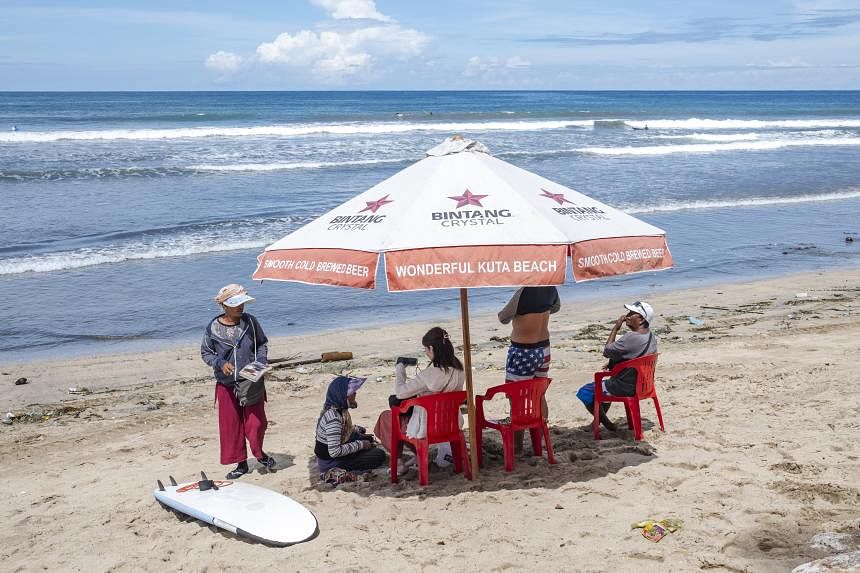
All foreigners including Singaporeans will have to pay 150,000 rupiah (S$13) in tourism tax when they visit Indonesia’s Bali from Feb 14 onwards.
The new tourism tax applies to those visiting mainland Bali as well as its surrounding islands such as Nusa Penida, Nusa Lembongan and Nusa Ceningan.
Tourists arriving from other parts of Indonesia via land or domestic flights also have to pay the tax. Children are not exempted.
As the levy is collected per entry, island-hoppers who are going to nearby Lombok and Gili Islands, which lie outside of Bali province, will have to pay another 150,000 rupiah when they return to Bali.
Bali tourism chief Tjok Bagus Pemayun first announced the start date of the tourism tax in September 2023.
He had assured that payment can be processed at airport counters in no more than 23 seconds, reported The Bali Sun.
But according to a recent official notice, tourists are encouraged to pay the tax via the Love Bali website or app before leaving for the island.
After payment is made, tourists should receive a tourism levy voucher in their e-mail, and they should save the voucher on their phones for scanning when they arrive at Bali’s airport or seaports.
The Bali provincial authorities said the tax will be used to improve tourist services, preserve Balinese culture and protect the environment.
Bali is among many destinations increasingly experiencing overtourism and the accompanying problem of environmental pollution, with some residents describing a plastic-covered coastline .
Tensions between locals and foreigners have also grown in recent years, after a number of troublemaking tourists made the news for working illegally, disrespecting religious sites, driving while intoxicated with alcohol, paying for services illegally in cryptocurrencies, among other offences.
Still, Bali’s tourism authority is expecting seven million tourists to visit the resort island in 2024, around 1.8 million more than the 5.2 million arrivals in 2023.
The federal authorities are hoping to attract 14 million visitors to Indonesia in 2024, with a target revenue of 200 trillion rupiah.
@straitstimes PSA for all of us Bali trippin’: Remember to pay the tourism tax 🏝️ The tax collected will be used to improve tourist services, preserve Balinese culture and protect the environment, said the authorities. #SGNews #Bali #balitips #traveltok #baliholidays #balitax #balilife #balitravel ♬ Vlog ・ Chill out in the lounge at night(1279860) - Ninja Muzik Tokyo
Singaporeans and other Asean nationals can visit Indonesia for up to 30 days without a visa, but other tourists must pay 500,000 rupiah for a 30-day visa on arrival, on top of the soon-to-kick in tourism tax.
In January, a steep entertainment tax of up to 75 per cent on services in karaoke lounges, nightclubs and spas was proposed.
The plan was scrapped by early February, after the authorities faced pushback from business owners and hospitality players who feared the tax would deter tourists from visiting the country.
Join ST's Telegram channel and get the latest breaking news delivered to you.
- Balinese food
Read 3 articles and stand to win rewards
Spin the wheel now

- Area - Denpasar
- Area - Kuta
- Area - Legian
- Area - Nusa Dua
- Area - Sanur
- Area - Seminyak
- Area - Ubud
- Hot Springs

Monkey Forest

Uluwatu Temple

Waterbom Park

Pura Besakih

Tanah Lot Temple

Tegalalang Rice Terrace

Gunung Kawi

Mount Batur

Bali Memorial

Nusa Dua Beach

Padang Padang Beach

Sightseeing Tours

Scuba Diving

Dolphin Swimming

White Water Rafting

New Years Eve

Ubud Writers & Readers Festival

Tumpek Uduh

Indonesian Independence Day

Tumpek Landep

Ubud Village Jazz Festival

Bali International Choir Festival

Sanur Village Festival

- Guest Houses
Gili Islands
Nusa lembongan.

- Rice Fields

7 Extraordinary Things To Do in Bali

4 Most Stunning Airbnb Accommodation to Stay in While Visiting Bali

Why Bali Has Always Been The Perfect Honeymoon Destination

5 Best Coworking Spots in Bali For Digital Nomads

Weather Forecast

Bali Airport

Places To Visit In Bali

Where To Stay In Bali

Indonesian Currency

Flights to Bali

Bali Holidays
- General Enquiries
- Advertising Enquiries
- Add Your Business
- Add Your Event

Departure Tax
Bali Departure tax, also known as Bali Airport Tax, was a fee that was charged for travellers leaving the island through Denpasar International Airport.
The fee was payable by everyone departing Bali from the airport, locals and foreigners alike. Kids below two years of age were exempted from this tax unless they were set to take up their own seat on the plane.
Bali Departure Tax for leaving Indonesia, How much is the cost?
This is a big win for travellers, as you no longer need to factor in extra time to make your departure time, nor do you have to keep any Indonesian Currency on you at the time of departure.
The Government is making an effort to streamline the process of visitors coming and going from Ngurah Rai International Airport which is one of the reasons that Bali is such a great travel destination for all travellers.
There are so many things to see and do whilst in Bali, so check out the full range of things to do which are detailed on this site.
Departure Tax Area, Street & Hotel Map, Bali
Other places we recommend.

About the author
Michael Jones
Michael created and runs the Bali Travel Hub website, as well as the Holiday Point travel brand that incorporates a network of 16 location based travel information and attraction websites around Australia, Asia, and around the world.
With 25+ years of online experience and a passion for travel (having travelled to Bali many times and staying in different locations on the Island), Michael not only researches and writes content for the website, he also tinkers behind the scenes with the website functionality & design.
Please reach out if you have any questions or suggestions.
Do You Have a Question to Ask?
Cancel reply.
Please Enter Your Question Below
Your Name *
Your Email *
Upcoming Events
Omed omedan, ngembak geni, purnama kedasa, idul fitri festival, tumpek krulut, kartini day, bali spirit festival, tumpek kandang.


Search Smartraveller

Latest update
Exercise a high degree of caution in Indonesia overall due to security risks.
Higher levels apply in some areas.

Indonesia (PDF 699.19 KB)
Asia (PDF 2.21 MB)
Local emergency contacts
Fire services, ambulance and rescue services, medical emergencies.
Call 110 or 112.
Tourist Police, Bali
Call (+0361) 759 687.
Tourist Police, Jakarta
Call (+201) 526 4073.
Advice levels
Exercise a high degree of caution in Indonesia overall.
Reconsider your need to travel to the provinces of Papua (Papua), Papua Highlands (Papua Pegunungan), Central Papua (Papua Tengah) and South Papua (Papua Selatan).
Reconsider your need to travel to the provinces of Papua, Papua Pegunungan, Papua Tengah and Papua Selatan due to the risk of serious security incidents or demonstrations that may turn violent.
- There's an ongoing risk of terrorist attack in Indonesia. Be alert to possible threats. Take official warnings seriously and follow the advice of local authorities. Popular tourist areas may be the target of terrorist attacks.
- Public protests and events that draw large groups of people occur regularly and can turn violent with little notice. Expect traffic delays and restricted access to locations if there are protests. Avoid protests and demonstrations and monitor local media for the latest updates.
- Many of Indonesia's volcanoes are active and can erupt without warning. Adhere to exclusion zones around volcanoes, which can change at short notice, and follow the advice of local authorities. Domestic and international flights can be disrupted. Monitor Indonesia's Volcano Observatory Notice for the latest volcanic activity (Bahasa Indonesia and English), Global Disaster Alert and Coordination System and the Volcanic Ash Advisory Centre for updates.
- There's been tension, including demonstrations and violence, in certain towns in the provinces of Papua, Papua Pegunungan, Papua Tengah and Papua Selatan in recent years. Armed groups have stated that they're targeting foreigners, including Australians. Our ability to provide consular support in these provinces is limited. Armed groups have shot at aircraft, including commercial planes, in remote airports in Papua Pegunungan and Papua Tengah provinces.
- Petty and violent crime occurs in Indonesia. Opportunistic crime, such as pickpocketing occurs. Drinks may be spiked or mixed with toxic substances. Crimes involving taxis and taxi drivers occur. Solo women are at higher risk. Be alert in taxis, public transport, crowds, bars and nightclubs.
- Legal disputes over real estate are common, including in Bali. Before entering into an agreement or providing financial details, do your research and get legal advice.
- Natural disasters such as severe weather, floods, landslides, earthquakes, volcanic eruptions and tsunamis occur regularly. Weather conditions can change quickly during the wet season (October – April). Regularly check weather reports, monitor media and speak to your travel provider before continuing with planned activities. Follow the advice of local authorities.
- When undertaking adventure activities, ensure that functioning safety equipment is available, that you have travel insurance and that your policy covers you for these activities.
Full travel advice: Safety
- The standard of medical facilities in Indonesia is generally lower than in Australia. Many regional hospitals only provide basic facilities.
- Some medications, including prescription medications, drugs for attention deficit hyperactivity disorder (ADHD), all cannabis-based products including medicinal cannabis, cannabis-based oils and creams, hemp-based products, CBD, THC, hash and edibles, are illegal in Indonesia. Harsh penalties, such as arrest and jail time, can apply even if you have a prescription. Make sure your medication is legal in Indonesia .
- Purchasing prescription medication online or over the counter in Indonesia without an Indonesian prescription is illegal. Ensure you provide a valid prescription from an Indonesian doctor before purchasing prescription medication and confirm that it's accepted by the seller before your purchase.
Full travel advice: Health
- Indonesia has revised its criminal code, which includes penalties for cohabitation and sex outside of marriage. These revisions will not come into force until January 2026.
- Penalties for drug offences include heavy fines, long prison sentences and the death penalty. Police target tourist destinations.
- Some medications are illegal in Indonesia. Harsh penalties can apply even if you have a prescription. It is also illegal to purchase prescription medications online or over the counter without an Indonesian prescription. Ensure you have a valid Indonesian prescription. See ' Health '.
The death penalty exists for some crimes in Indonesia.
- Standards of dress and behaviour are conservative in many parts of Indonesia. Learn about local customs. Take care not to offend.
- Aceh province upholds aspects of sharia law. Sharia law applies to everyone, including travellers. Inform yourself about the laws, and be careful not to offend or break local laws. If in doubt, seek local advice.
Full travel advice: Local laws
- The Bali Provincial Government has introduced a new tourist levy of IDR 150,000 per person to foreign tourists entering Bali. The tourist levy is separate from the e-Visa on Arrival or the Visa on Arrival. Cashless payments can be made online prior to travel or on arrival at designated payment counters at Bali's airport and seaport. See the Bali Provincial Government's official website and FAQs for further information.
- If you're travelling to Indonesia for tourism, official government duties or business meetings, you can apply for an e-Visa on Arrival (e-VOA) online at least 48 hours before your travel to Indonesia. This also applies if you're transiting through Indonesia at international airports, seaports and land crossings. You can get a Visa on Arrival (VOA) at some international airports, seaports or land crossings.
- To apply for the e-VOA or VOA, you must have an ordinary (non-emergency) passport with at least 6 months of validity from the date you plan to enter (we also recommend having at least 6 months of passport validity from the date you plan to leave Indonesia, to avoid any issues for your departure or onward travel) and a return or onward flight booking to another country.
- You may need to apply for a visa in advance to enter Indonesia for purposes not covered by the e-VOA or VOA. Check the latest entry requirements with your travel provider or an Embassy or Consulate of Indonesia before travel. Entry, exit and transit conditions can change at short notice. Monitor media for the latest updates.
- You'll be required to complete an e-customs declaration for arrival. You can complete this within 3 days of departure to Indonesia.
- Travel requirements may change at short notice, including travel to Bali and Jakarta by air, land or sea. Contact your travel provider and monitor media for up-to-date details.
Full travel advice: Travel
Local contacts
- The Consular Services Charter tells you what the Australian Government can and can't do to help when you're overseas.
- For consular help, contact the Australian Embassy, Jakarta , the Australian Consulate-General, Bali , the Australian Consulate-General, Makassar or the Australian Consulate-General, Surabaya .
- To stay up to date with local information, follow the Embassy's social media accounts.
Full travel advice: Local contacts
Full advice
The terrorist threat in Indonesia is ongoing. Attacks could happen anywhere and anytime. This includes places that foreigners visit.
Be alert to possible threats. Take official warnings seriously and follow the advice of local authorities. Remain respectful of religious and local customs.
Indonesian authorities continue to investigate and disrupt terrorist groups in Indonesia, including Bali.
Terrorist attacks are motivated by extreme beliefs. Both local grievances as well as events in other parts of the world could motivate extremists in Indonesia towards violence.
Recent terrorist attacks
In December 2022, an explosion occurred at a police station in Bandung, Jawa Barat, killing 2 and injuring 11.
In March 2021, 2 suicide bombers attacked a church in Makassar, injuring dozens.
In the past, police have said that terrorist suspects remain at large and may seek Western targets.
Indonesian security agencies continue to conduct operations against terrorist groups.
Terrorists in Indonesia may carry out small-scale violent attacks with little or no warning.
Be alert in places of worship, especially during periods of religious significance.
Terrorists have targeted places of worship in:
As well as places of worship, other possible targets by terrorists include:
- Indonesian government facilities, premises and symbols associated with the Indonesian Government
- police stations and checkpoints
- bars, nightclubs, cafes and restaurants
- cinemas and theatres
- shopping centres, public transport and transport hubs
- airports and airlines
- clubs, including sporting clubs
- tourist areas and attractions, tour buses and tour groups
- outdoor recreation events
Supporters have committed additional acts of violence in response to high-profile extremists being detained or killed.
To protect yourself during a terrorist attack:
- leave the area as soon as it's safe
- follow the advice of local authorities
- don't gather in a group after an attack
- don't gather in a group if you're evacuated from a building
Security remains at a high level at:
- the Australian Embassy in Jakarta
- the Consulates-General in Bali, Makassar and Surabaya
More information:
Civil unrest and political tension
Most events are announced before they happen; however, protests may occur with little or no notice.
Protests and events are often held near major government buildings and embassies in Jakarta, including the Australian Embassy.
Protests may also occur at any of Australia's Consulates-General in Surabaya, Bali and Makassar, at government buildings, or the offices of international organisations in Indonesia.
You can expect traffic delays and restricted access to locations if there are protests.
Phone or email ahead for an appointment before going to the Embassy or the Consulates-General (see Local contacts ).
Demonstrations and acts of violence can happen when courts try and sentence extremists.
Conflict between different communities can sometimes occur, including in the provinces of Papua, Papua Pegunungan, Papua Tengah and Papua Selatan. Our ability to provide consular support in these provinces is limited.
Local violence can also be directed at minority groups in other parts of Indonesia, including in Java.
If you're found to endanger security or public order, you may be prosecuted under Indonesia's Immigration laws, which may result in imprisonment or deportation.
To protect yourself from possible violence:
- avoid protests and demonstrations
- monitor local media for the latest security updates
- plan your activities to avoid potential unrest on significant dates
- be prepared to change your travel plans
- Demonstrations and civil unrest
Armed conflict
The provinces of Papua, Papua Pegunungan, Papua Tengah and Papua Selatan experience regular violent clashes involving armed groups, civilians, Indonesian police, and the military. Armed groups have stated that they are targeting foreigners, including Australians. Our ability to provide consular support in these provinces is limited.
Many people have been killed and injured in clashes. This includes members of security forces, armed groups and civilians. Violent attacks have occurred in several areas of these provinces, including in and around Jayapura. There's a risk of more attacks.
On 23 February 2023, a riot broke out in Wamena, Papua Pegunungan, when a crowd attacked Indonesian security personnel following the arrest of two people accused of child kidnapping. 12 civilians and rioters were killed.
Violent attacks have occurred around the Freeport Mine in Papua Tengah.
Armed groups have:
- taken a New Zealand pilot hostage in Paro, Papua Pegunungan
- shot at aircraft, including commercial planes, at Beoga airport in Pupua Tengah province and Nop Goliat Dekai airport in Papua Pegunungan province.
- killed people in attacks, including one Australian
- attacked vehicles using the road between Grasberg and Timika
- killed people in violent attacks in Puncak Jaya District, Papua Tengah
- more attacks are possible and could target infrastructure and national institutions.
A range of crimes, including violent crime, occur in Indonesia. Crimes can happen in popular tourist locations in Bali.
To protect yourself from crime:
- be aware of your surroundings
- be alert in crowds
- understand the potential crime risks
Theft, robbery and bag and phone snatching have occurred. These crimes can sometimes involve violence. Opportunistic crime such as pickpocketing occurs.
Be careful of thieves:
- on motorcycles targeting pedestrians
- in upmarket shopping malls
- in crowded public transport
- at traffic lights targeting people in stopped cars
- at bars and nightclubs
- when entering accommodation, including villas in Bali
Keep bags and valuables out of sight in vehicles.
If you're travelling on foot, walk:
- on footpaths
- away from the curb
- with your bag held away from traffic
Sexual assault
If you're a victim of sexual assault :
- get immediate medical assistance. If you have any doubts about seeking medical assistance after a sexual assault, contact your nearest Australian Embassy or Consulate in Indonesia (see Local contacts ) as quickly as possible.
- make a full statement to local police, in person, so they can conduct a criminal investigation. You may wish to seek consular help before you visit the police station. Contact your nearest Australian Embassy or Consulate (see Local contacts ).
Local police can only investigate a crime after you've left Indonesia if you've reported it.
Your sworn statement, or statements by witnesses, can be used as evidence in criminal court proceedings.
You don't always need to be in Indonesia for trial. Neither do witnesses who live outside of Indonesia.
Counselling support
Should you wish to speak to a counsellor, you can call the 24-hour Consular Emergency Centre on +61 2 6261 3305 or contact your nearest Australian Embassy or Consulate (see Local contacts ). They can connect you to counselling hotlines and services.
- Reducing the risk of sexual assault
Bars and nightclubs
Be alert in bars and nightclubs. Drink-spiking and snatching of valuables may occur if you're not alert.
Drinks may be contaminated with drugs or toxic substances. See Health .
Don't leave your food or drinks unattended.
Never accept drinks, food, gum, cigarettes, vapes or e-cigarettes from people you've just met.
- Partying safely
Credit card and ATM fraud
Credit card, online banking and ATM fraud occurs in Indonesia.
Check your bank statements.
Make sure your bank doesn't block your cards. Tell your bank you'll be visiting Indonesia.
Never let your card out of your sight. This includes when you pay in restaurants.
Shield your PIN from sight.
Some vendors install hidden cameras and use card skimmers.
Don’t click on unknown links in WhatsApp or mobile phone text messages, particularly if your phone is linked to mobile banking.
Use ATMs at controlled and secure places, such as:
- shopping centres
Scams and confidence tricks
Beware of scams and confidence tricks.
Only exchange money at authorised money changers. Authorised money changers can also be found on the Bali Foreign Exchange website . Unauthorised money changers have been known to scam foreign tourists in Bali and elsewhere.
All types of gambling are illegal in Indonesia.
Australians have lost large sums of money in card game scams run by organised gambling gangs, particularly in Bali. See Local laws
Some tourists have been robbed or planted with drugs after taking new acquaintances back to their hotel rooms. In some cases, their drinks were spiked.
Legal disputes over the purchase of real estate are common, including in Bali, involving:
- holiday clubs and resorts
- timeshare schemes
Before entering into an agreement or providing financial details:
- thoroughly research the proposal
- get legal advice and know your rights, especially before you sign any documents
Using taxis
Only use licensed official metered taxis. Crimes involving unregistered taxis include:
- taxis departing before the passenger can take their baggage from the vehicle
- taxi drivers robbing or temporarily holding passengers, including in urban areas
- taxi drivers forcing passengers to withdraw money at ATMs before releasing them
Lone female travellers are at higher risk of crime.
If you're in an incident involving a taxi, leave the taxi and the immediate area if it's safe to do so.
To protect yourself from overcharging and scams:
- only travel in licensed taxis with signage, a "taxi" roof sign and meters working
- ensure the driver's identification card is visible
- book via your phone, on an official taxi company mobile app, from inside an airport, or at stands at major hotels
See Travel .
Cyber security
You may be at risk of cyber-based threats during overseas travel to any country. Digital identity theft is a growing concern. Your devices and personal data can be compromised, especially if you're connecting to Wi-Fi, using or connecting to shared or public computers, or to Bluetooth.
Social media can also be risky in destinations where there are social or political tensions, or laws that may seem unreasonable by Australian standards. Travellers have been arrested for things they have said on social media. Don't comment on local or political events on your social media.
- Cyber security when travelling overseas
Kidnapping occurs across the world with political, ideological and criminal motives. Foreigners, including Australians, have been kidnapped overseas while travelling. Kidnaps can happen anywhere, anytime, including destinations that are typically at lower risk.
On 7 February 2023, a New Zealand pilot was taken hostage by an armed group in Paro, Papua Pegunungan.
The Australian Government's longstanding policy is that it doesn't make payments or concessions to kidnappers.
Adventure activities
Many businesses don't follow safety and maintenance standards. This includes transport and tour operators, water sports providers, hotels, restaurants and shops.
It may affect adventure activities, such as:
- bungee jumping
- scuba diving and snorkelling
- chairlift or gondola rides
In the past, Australians have been seriously injured or died while participating in adventure activities. If you require intensive care medical treatment, emergency surgery or medical evacuation. The Australian Government won't pay for these costs.
If you plan to do an adventure activity :
- check if your travel insurance policy covers it
- ask about safety, search and rescue procedures
- ask about and insist on minimum safety requirements
- always use available safety gear, such as life jackets or seatbelts
- check with your travel provider on vessel capacity limits before embarking on sea, land or air travel
- check weather and ocean conditions, and whether the vessel has had any mechanical issues, on the day and before continuing with water activities or sea travel
- check where the nearest medical facilities are
If proper safety equipment isn't available or you're unsure of the provider's safety or maintenance procedures, use another provider.
Trekking and climbing
Some mountain treks suit only experienced climbers. Travel with a guide and check the level of difficulty beforehand.
Many trekking options may be on or around an active volcano. Many of Indonesia's volcanoes are active and can erupt without warning. Volcanic and seismic activity may continue for some time. Adhere to exclusion zones around volcanoes, which can change at short notice, and follow the advice of local authorities. If you're planning to travel to an area near an active volcano, check with local authorities before climbing and check:
- Bureau of Meteorology Volcanic Ash Advisory Centre
- MAGMA Indonesia (Bahasa Indonesia) for daily updates on status and alert levels
- National Disaster Management Authority (BNPB) (Bahasa Indonesia)
- Global Disaster Alert and Coordination System
Swimming safety
People have drowned in coastal areas, including in Bali, due to rough seas, strong currents, or from swimming, snorkelling or scuba diving in areas where there is frequent passage of boats, resulting in collisions.
Local beach rescue services may not be of the same standard as in Australia.
Saltwater crocodiles are in rivers throughout Indonesia. Avoid swimming around river estuaries and seek local advice in other locations.
If you plan to spend time in or on the water:
- regularly check weather reports as sea conditions can change rapidly
- take warnings seriously
- check media and local sources for information about potential dangers
- speak to your travel provider about safety equipment and weather conditions before continuing with planned activities
- take a friend or family member with you when you undertake swimming or water activities
- be careful when swimming, snorkelling or scuba diving near motor-powered boats or where there is frequent passage of boats
- ensure you have travel insurance and that your policy covers you for planned activities
Ensure you have travel insurance and that your policy covers you for planned activities.
Climate and natural disasters
Indonesia experiences natural disasters and severe weather , including:
- landslides and mudslides
- volcanic eruptions
- earthquakes
- storms resulting in turbulent sea conditions
- tsunamis and high wave events
If there's a natural disaster or severe weather:
- always carry your passport in a waterproof bag
- keep in contact with family and friends
- check the media and local sources for information
- don't undertake sea, land or air travel if it's not safe to do so
- Indonesian Meteorology, Climatology and Geophysics Agency (BMKG) (English and Bahasa Indonesia)
- BMKG Multi-Hazard Early Warning System app (English and Bahasa Indonesia)
Floods and mudslides
Floods , landslides and mudslides occur regularly during the wet season from October to April, with some severe events resulting in injury, displacement, death or damaged infrastructure.
Heavy rains can cause significant flooding in urban areas, including the greater Jakarta region, causing disruption to transportation. Monitor the local media for updates.
Walking and driving in flooded areas can be dangerous. Flood waters may hide uncovered drainage ditches.
Volcanic activity may escalate with little or no notice, leading to flight disruptions and airport closures, including in surrounding provinces. Contact your airline for the latest flight information.
There are 147 volcanoes in Indonesia. 76 of them are active volcanoes and could erupt at any time.
Volcanic alert levels and exclusion zones may rise quickly. You may be ordered to evacuate at short notice. Volcanic activity can disrupt domestic and international flights. There are 4 volcano alert levels in Indonesia; 1 - normal, 2 - advisory, 3 - watch, 4 - warning.
Before you travel to areas that are prone to volcanic activity, monitor media and ensure you read the Indonesian Government's latest advice on current volcanic activity, including:
- Volcanic Activity Report by Indonesia's Multiplatform Application for Geohazard Mitigation and Assessment (MAGMA) (Bahasa Indonesia)
- Volcano Activity and Observatory Notices (English and Bahasa Indonesia)
- MAGMA Indonesia Map of Latest Volcano Levels and Climate Information (Bahasa Indonesia)
- Bureau of Meteorology's Volcanic Ash Advisory Centre
If there's volcanic activity:
- avoid the area
- take official warnings seriously and adhere to exclusion zones
- follow the instructions and advice of local authorities
- follow evacuation orders
- read our advice on Volcanic eruptions while travelling
Volcanic ash can cause breathing difficulties. The risk is higher for people with chronic respiratory illnesses, including:
Recent and frequent volcanic activity has included:
- Mount Ile Lewetolok in East Nusa Tenggara (Nusa Tenggara Timur)
- Mount Lewotobi Laki Laki in East Flores Regency, Nusa Tenggara Timur
- Mount Marapi in West Sumatra
- Mount Anak Krakatau, to the south of Sumatra
- Mount Merapi, near Yogyakarta
- Mt Dukono in North Sulawesi
- Mount Semeru, near Malang, East Java
- Mount Agung in Bali
- Mount Sinabung in North Sumatra
Some trekking routes are on or near active volcanoes, including Mount Agung and Mount Batur in Bali, Mount Marapi in West Sumatra, Mount Merapi near Yogyakarta, Mount Rinjani in Lombok, Mount Bromo and Mount Ijen in East Java. See 'Trekking and climbing'.
If you're planning to travel to an area near an active volcano, make sure you have comprehensive travel insurance and check if any restrictions apply.
If a volcanic eruption occurs:
- make a backup plan in case you're affected
- contact your airline or travel insurer to confirm flight schedules and get help
- keep in touch with family and friends
- Learn more about volcanic eruptions (Geoscience Australia)
- See practical advice and information about volcanic eruptions (US CDC)
- See worldwide volcanic activity reports in real-time (GDACS)
Earthquakes
Indonesia is in an active earthquake region. It has a high level of earthquake activity, that sometimes triggers tsunamis.
There are approximately 4,000 earthquakes across Indonesia every year. Around 70 to 100 of these are over 5.5 magnitude.
Earthquakes can cause death, injury and significant damage to infrastructure.
Strong earthquakes can occur anywhere in Indonesia. They are less common in Kalimantan and south-west Sulawesi.
To stay safe during an earthquake:
- know the emergency plans at your accommodation
- take precautions to avoid exposure to debris and hazardous materials, including asbestos
- MAGMA Indonesia (Bahasa Indonesia)
- Indonesia's Meteorology, Climatology and Geophysics Agency (Bahasa Indonesia) or BMKG Multi-Hazard Early Warning System app (English and Indonesia)
- Indonesia's Centre for Volcanology and Geological Disaster Mitigation (Bahasa Indonesia)
- US Federal Emergency Management Agency advice on what to do before, during and after an earthquake (English)
Forest fires and smoke haze
During the dry season in April to November, widespread forest fires can cause smoke haze resulting in poor air quality across parts of Indonesia, particularly the Riau Islands, central Sumatra and Kalimantan.
Smoke haze could affect your health and travel plans.
Keep up to date with local information and seek medical advice on appropriate precautions.
- ASEAN Regional Haze Situation
- Smartraveller advice on Bushfires
Tsunamis and high wave events
The Indian and Pacific Oceans experience more frequent, large and destructive tsunamis than other parts of the world.
There are many large earthquakes along major tectonic plate boundaries and ocean trenches.
High wave events can happen throughout coastal regions and between islands. They're caused by strong weather conditions and storms.
If you plan to surf, undertake water activities or travel by sea, check local conditions regularly.
If there’s a tsunami or high wave event:
- don't travel by sea if it's not safe to do so
- Indonesia Tsunami Early Warning Centre issues warnings when a potential tsunami with significant impact is expected
- Indonesia's Meteorology, Climatology and Geophysics Agency with the latest list of earthquakes with a magnitude greater than 5.0 on the Richter scale (Bahasa Indonesia) or BMKG Multi-Hazard Early Warning System app (English and Bahasa Indonesia)
- US Federal Emergency Management Agency page on what to do before, during and after an earthquake
Piracy occurs in the coastal areas of Indonesia.
The International Maritime Bureau (IMB) issues weekly piracy reports.
If you decide to travel by boat in these regions:
- check IMB piracy reports
- get local advice
- arrange security measures
- Travelling by boat
- Going on a cruise
- International Maritime Bureau
Travel insurance
Get comprehensive travel insurance before you leave.
Your policy needs to cover all overseas medical costs, including emergency treatment and medical evacuation. The Australian Government won't pay for these costs.
If you can't afford travel insurance, you can't afford to travel. This applies to everyone, no matter how healthy and fit you are.
If you're not insured, you may have to pay many thousands of dollars up-front for medical care.
Before you travel, confirm:
- what activities and care your policy covers
- that your insurance covers you for the whole time you'll be away, including on all forms of transport you plan to take
- whether it covers medical evacuation in the event of hospitalisation or injury
- any exclusions to your policy
Physical and mental health
Consider your physical and mental health before you travel, especially if you have an existing medical condition.
See your doctor or travel clinic to:
- have a basic health check-up
- ask if your travel plans may affect your health
- plan any vaccinations you need
Do this at least 8 weeks before you leave.
If you have immediate concerns for your welfare or the welfare of another Australian, call the 24-hour Consular Emergency Centre on +61 2 6261 3305 or contact your nearest Australian Embassy, High Commission or Consulate to discuss counselling hotlines and services available in your location.
- General health advice
- Healthy holiday tips (Healthdirect Australia)
Not all medication available over the counter or by prescription in Australia is available in other countries. Some may even be considered illegal or a controlled substance, even if prescribed by an Australian doctor.
Some drugs used to treat attention deficit hyperactivity disorder (ADHD) are illegal in Indonesia.
If you plan to bring over-the-counter or prescription medication, check if it's legal in Indonesia by contacting the Indonesian Embassy in Canberra well in advance of your planned travel. Take enough legal medicine for your trip and carry it in its original packaging. Purchasing prescription medication online in Indonesia without an Indonesian prescription is illegal. Ensure you provide a valid prescription from an Indonesian doctor before purchasing prescription medication and confirm that it's accepted by the seller prior to your purchase.
Carry a copy of your prescription and a letter from your doctor stating:
- what the medicine is
- your required dosage
- that it's for medical treatment or use
If you're caught with illegal medicine, you could face detention, fines or harsher penalties. You could face charges even if an Australian doctor prescribed the medication.
Ask the Indonesian Embassy in Canberra for advice before you travel.
Medicinal cannabis and cannabis-based products
Cannabis-based products such as cannabis oil and creams, hemp, CBD, THC, hash and edibles remain illegal in Indonesia, including for medicinal purposes. A medical prescription does not make it legal. If you take such products to Indonesia or purchase or use them in Indonesia, you can be arrested and face imprisonment, fines, deportation or the death penalty.
- Medications
Health Risks
Critical care for Australians who become seriously ill, including in Bali, is significantly below the standard available in Australia. Medical evacuation may not be possible.
The Australian Government cannot guarantee your access to hospitals and other health services in Indonesia.
Medical evacuation to Australia for medical conditions, is possible but is very expensive and may not be covered by travel insurance. Check your policy before you travel.
Ban on sale of liquid/syrup medication
The Indonesian Ministry of Health (MoH) has advised local health workers and pharmacists to stop selling liquid/syrup medication, including commonly used medications containing paracetamol and cough syrups. MoH and the Indonesian Paediatrician Association (IDAI) received reports of a sharp increase in cases of Atypical Progressive Acute Kidney Injury (AKI) in children , especially under the age of 5 years.
Insect-borne illnesses
Insect-borne illnesses are common throughout the year.
To protect yourself from disease:
- research your destination
- ask locals for advice
- make sure your accommodation is mosquito-proof
- use insect repellent
- wear long, loose, light-coloured clothing
Dengue occurs throughout Indonesia, including Bali, Jakarta and other major cities.
Dengue is common during the rainy season.
Australian health authorities have reported an increase in dengue infections in people returning from Bali in recent years.
Consult your travel doctor for further information on available vaccines and their suitability for your individual circumstances.
Zika virus can occur in Indonesia.
Protect yourself from mosquito bites.
The Australian Department of Health and Aged Care advises pregnant women to:
- discuss any travel plans with their doctor
- consider deferring non-essential travel to affected areas
Malaria , including chloroquine-resistant strains, is widespread in rural areas, particularly in the provinces of Papua, Papua Pegunungan, Papua Tengah, Papua Selatan, Papua Barat Daya, Papua Barat, Maluku and Nusa Tenggara Timur. There is no malaria transmission in Jakarta.
- Consider taking medicine to prevent malaria.
Japanese encephalitis and filariasis
Japanese encephalitis and filariasis occur in Indonesia, especially in rural agricultural areas.
Japanese encephalitis has been present in Australian travellers returning from Indonesia, including Bali.
Vaccination is recommended for certain groups of travellers.
- Infectious diseases
Drink poisoning
People have been poisoned by alcoholic drinks contaminated with harmful substances, including methanol and arak (a traditional rice-based spirit). Locals and foreigners, including Australians, have died or become seriously ill from poisoned drinks.
Cases of drink poisoning have been reported in Bali and Lombok.
Contaminated drinks have included:
- local spirits
- spirit-based drinks, such as cocktails
- brand name alcohol
To protect yourself from drink poisoning:
- consider the risks when drinking alcoholic beverages
- be careful drinking cocktails and drinks made with spirits
- drink only at reputable licensed premises
- avoid home-made alcoholic drinks
Labels on bottles aren't always accurate.
Symptoms of methanol poisoning can be similar to drinking too much. However, they are usually stronger.
Symptoms of methanol poisoning include:
- vision problems
Vision problems may include:
- blindness, blurred or snowfield vision
- changes in colour perception
- difficulty looking at bright lights
- dilated pupils
- flashes of light
- tunnel vision
If you suspect that you or someone you're travelling with may have been poisoned, act quickly. Urgent medical attention could save your life or save you from permanent disability.
Report suspected cases of methanol poisoning to the Indonesian police.
Magic mushrooms
Don't consume magic mushrooms. They're illegal.
Australians have become sick or injured after taking magic mushrooms.
Australians have been in trouble with local police after taking magic mushrooms, particularly in Bali.
Magic mushrooms can cause major health problems, including:
- erratic behaviour
- severe hallucinations
Rabies is a risk throughout Indonesia, especially in:
- Nusa Tenggara Timur, including Labuan Bajo
- South Sulawesi
- West Kalimantan
- Nias, off the west coast of Sumatra
To protect yourself from rabies:
- avoid direct contact with dogs
- don't feed or pat animals
- avoid contact with other animals, including bats and monkeys.
Talk to your doctor about getting a pre-exposure rabies vaccination.
If bitten or scratched by an animal:
- immediately use soap and water to wash the wound thoroughly for 15 minutes
- seek urgent medical attention.
Rabies treatment in Indonesia may be limited, including the rabies vaccine and immunoglobulin availability. If you're bitten, you may need to return to Australia or travel to another country for immediate treatment.
You're at risk of contracting rabies if you visit a market where live animals and fresh food are sold because:
- live rabies-positive dogs may be present
- rabies-positive dog meat may be sold as food
Selling dog meat for human consumption is a breach of government disease control regulations.
Avoid contact with monkeys, even in places where you're encouraged to interact with them. This includes:
- popular markets
- tourist destinations
- sanctuaries
Legionnaires' disease
Cases of Legionnaires' disease have been reported in people who have travelled to Bali. Travellers who are unwell with flu-like symptoms within 10 days of returning from Bali are advised to consult their GPs.
- Legionnaires' disease warning for Bali travellers (Western Australian Government Department of Health)
- Legionnaires’ disease (Better Health Channel, Victorian Government Department of Health)
- Legionnaires' disease (World Health Organization)
Cases of poliovirus (type 1) have been reported in the provinces of Papua, Papua Pegunungan, Papua Tengah and Papua Selatan. Poliovirus (type 2) cases have been reported in the provinces of Aceh, East, West and Central Java. There may be unreported cases in other provinces in Indonesia.
Ensure that you're vaccinated against polio.
- Factsheet on poliovirus types (World Health Organization)
- Health emergencies information for Indonesia (World Health Organization)
Periodic outbreaks of measles continue to be reported in Indonesia, including Bali.
You need 2 doses of vaccine 4 weeks apart to be fully vaccinated against measles.
If you have symptoms of measles, seek medical attention.
Measles is highly infectious. Call before attending a healthcare facility.
Nipah Virus and Yellow Fever
There are no cases of Nipah virus or Yellow Fever in Indonesia. You may be temperature checked on arrival at international and domestic airports. If you have fever symptoms, you may be referred to the airport clinic for further tests and asked to seek medical treatment. See your doctor or travel clinic before you travel to plan any vaccinations you need.
HIV/AIDS is a risk for travellers. Take steps to reduce your risk of exposure to the virus.
Other health risks
Waterborne, foodborne, parasitic and other infectious diseases are widespread. These include:
- tuberculosis
Serious outbreaks sometimes occur.
To protect yourself from illness:
- boil drinking water or drink bottled water
- avoid ice cubes
- avoid raw food, such as salads
To minimise the risk of food poisoning, only eat meat from reputable suppliers.
Seek urgent medical attention if you suspect food poisoning or have a fever or diarrhoea.
Seafood toxins
You can become sick from naturally occurring seafood toxins, including:
- ciguatera fish poisoning
- scombroid (histamine fish poisoning)
- toxins in shellfish
Avoid temporary black henna tattoos. The dye often causes serious skin reactions.
Before you get any tattoo, check the hygiene and safety of your tattoo provider.
Medical care
Medical facilities.
The standard of medical facilities in Indonesia is generally lower than Australia. Many regional hospitals only provide basic facilities.
Hospitals expect families to provide support to patients, including all financial support.
Psychiatric and psychological services are limited in Indonesia. Hospital staff may use physical restraints on patients.
When diving in Indonesia, there is a risk that you may experience decompression illness. An illness may occur when a diver ascends to the water surface too quickly and may have severe consequences. Understand the risks before you dive.
Decompression chambers are available in various areas, including the following locations:
- Bali's Sanglah General Hospital
- Siloam Hospital in Labuan Bajo
- Hospitals in Jakarta, Balikpapan, Bintan, Medan, Makassar, Raja Ampat (Waisai), Maluku, Tual and Manado near popular dive sites
Before admitting patients, hospitals usually need:
- guarantee of payment from the patient or their next of kin (family or friend)
- confirmation of medical insurance
- deposit payment
There's no reciprocal healthcare agreement between Australia and Indonesia.
The Australian Government cannot provide guarantee of payment, confirmation of medical insurance or a deposit payment for services.
If you become seriously ill or injured, you may need to be evacuated to a place with better care. Medical evacuation can be very expensive. Check your insurance policy before you travel. The Australian Government won't pay for these costs. It's best to check with your travel provider on the location and functionality of decompression chambers and other medical facilities available in the area before undertaking remote travel.
You're subject to all local laws and penalties, including those that may appear harsh by Australian standards. Research local laws before travelling.
Indonesian Parliament has passed revisions to its criminal code, which includes penalties for cohabitation and sex outside of marriage. These revisions will not come into force until January 2026.
Indonesia has signed into law revisions to the Electronic and Information Transactions Law (ITE Law). Tough penalties apply for defamation, hate speech, spreading hoaxes and uploading immoral content to the Internet. The law applies both within and outside Indonesia.
If you're arrested or jailed, the Australian Government will do what it can to help you under our Consular Services Charter . But we can't get you out of trouble or out of jail.
- Arrested or jailed
Penalties for drug offences are severe. They include the death penalty.
You may face heavy fines or jail for consuming or possessing even small amounts of drugs, including marijuana. Cannabis-based products such as cannabis oil and cream, hemp, CBD, THC, hash and edibles remain illegal in Indonesia, including for medicinal purposes. A medical prescription does not make it legal. If you take such products to Indonesia or purchase or use them in Indonesia, you can be arrested and face imprisonment, fines, deportation or the death penalty.
Some prescription medications that are available in Australia are illegal in Indonesia. Purchasing prescription medication online or over the counter in Indonesia without an Indonesian prescription is illegal. Ensure you provide a valid prescription from an Indonesian doctor before purchasing prescription medication and confirm that it's accepted by the seller before your purchase.
Magic mushrooms are illegal. Indonesian police work to prevent their distribution.
Police target illegal drug use and possession across Indonesia. Police often target popular places and venues in Bali, Lombok and Jakarta.
- Carrying or using drugs
Local labour laws can change at short notice. This can affect expatriate workers.
Under Indonesian law, you must always carry identification. For example, your:
- Australian passport; and
- Resident's Stay Permit (if applicable)
Gambling is illegal.
Property laws are strict, seek legal advice before acquiring property in Indonesia.
It's sometimes illegal to take photographs in Indonesia. Obey signs banning photography. If in doubt, get advice from local officials. See Safety .
Australian laws
Some Australian criminal laws still apply when you're overseas. If you break these laws, you may face prosecution in Australia.
- Staying within the law and respecting customs
Local customs
Standards of dress and behaviour are conservative in many parts of Indonesia. Take care not to offend.
Find out what customs apply at your destination.
If in doubt, seek local advice.
LGBTQIA+ information
Same-sex relationships are legal in Indonesia, except in the province of Aceh. Same-sex relationships in Aceh may attract corporal punishment. Visible displays of same sex relationships could draw unwanted attention.
Some laws and regulations can be applied in a way that discriminates against the LGBTI community, including for pornography and prostitution.
- Advice for LGBTI travellers
The Islamic holiday month of Ramadan is observed in Indonesia. Respect religious and cultural customs and laws at this time.
During Ramadan, eating, drinking and smoking may be illegal in public during this time. If you're not fasting, avoid these activities around people who are. Seek local advice to avoid offence and follow the advice of local authorities.
Explore our Ramadan page to learn more, including dates for Ramadan.
Aceh is governed as a special territory, not a province, and has a degree of special autonomy.
Some aspects of sharia law are upheld. This includes regulations and punishments that don't apply in other parts of Indonesia.
Local sharia police enforce sharia law.
Sharia law applies to anyone in Aceh, including:
- foreigners (expats and travellers)
- non-Muslims
Sharia law doesn't allow:
- drinking alcohol
- prostitution
- same-sex relationships
- extra-marital sex
- co-habitation before marriage
It also requires a conservative standard of dress.
Learn about the laws in Aceh. If in doubt, seek local advice.
Dual citizenship
Indonesia doesn't allow dual nationality for adults, and you may be prosecuted by Immigration authorities should you be found to hold valid passports of two nationalities. If you entered Indonesia on your non-Australian citizenship passport, Indonesian Immigration will require you to exit Indonesia on that nationality's passport.
A child of Indonesian and Australian parents can maintain citizenship of both countries until the age of 18 years. Before a dual Australian-Indonesian citizen minor travels from Indonesia, additional identity documentation may be required from Indonesian Immigration. Check with Indonesian Immigration or the Indonesian Embassy in Canberra well in advance of your planned travel.
- Embassy and Consulate of Indonesia
- Information on limited dual citizenship
- Dual nationals
Visas and border measures
Every country or territory decides who can enter or leave through its borders. For specific information about the evidence you'll need to enter a foreign destination, check with the nearest embassy, consulate or immigration department of the destination you're entering.
Bali Tourism Levy
The Bali Provincial Government has introduced a new tourist levy of IDR 150,000 per person to foreign tourists entering Bali. The tourist levy is separate from the e-Visa on Arrival or the Visa on Arrival. Cashless payments can be made online prior to travel or on arrival at designated payment counters at Bali's airport and seaport. Exemption from payment of the levy applies to transit passengers and certain visa holders. See the Bali Provincial Government's official website and FAQs for further information.
e-Visa on Arrival and Visa on Arrival
You can apply for an e-Visa on Arrival (e-VOA) no later than 48 hours prior to travelling to Indonesia if you are travelling for tourism, business meetings, purchasing goods or transiting only. Check the e-VOA requirements from Indonesian Immigration before applying.
You can still apply for a regular Visa on Arrival (VOA) at certain international airports, seaports and land crossings, including Jakarta, Bali, Surabaya, Makassar, Lombok, Batam, Medan, Manado, Aceh, Padang, Tanjung Pinang and Yogyakarta, if you do not apply for an e-VOA at least 48 hours in advance of your travel to Indonesia.
The e-VOA or VOA can be used for tourism, official government duties, business meetings, or to transit through Indonesia. You cannot transit in Indonesia without an e-VOA or VOA.
Additional requirements apply if you are travelling on government duties.
For the latest list of entry points for the e-VOA or VOA, refer to the Directorate General of Immigration's list of land border crossings, international airports, and international seaports .
The e-VOA and VOA cost IDR 500,000 (approximately $A 50), with the e-VOA charging a small online processing fee.
For the VOA, some airports, including Jakarta's international airport, are only accepting cash payment. Card payment facilities are available at Bali's international airport. ATM facilities may be in high demand. Be prepared to pay in cash if required.
The visa is valid for a 30 day stay and can be extended once (for a maximum of 30 days) by applying at an immigration office within Indonesia. Ensure you extend your visa within the initial 30 days to avoid an overstay fine and deportation.
To apply for a regular VOA, you must show:
- your ordinary (non-emergency) passport with at least 6 months of validity from the date you plan to enter (we also recommend having at least 6 months passport validity from the date you plan to leave Indonesia, to avoid any issues for your departure or onward travel)
- a return flight booking to Australia or onward flight booking to another country
Contact your travel agent, airline, or your nearest Embassy or Consulate of Indonesia for details.
Other visas
If you're entering Indonesia from a port or airport that does not issue a visa on arrival, or you're visiting Indonesia for a purpose not allowed under the e-VOA or VOA conditions, you must apply for a visa in advance of travel. Check the Indonesian Immigration website for further information, or contact your nearest Embassy or Consulate of Indonesia .
Overstaying your permit may result in fines, detention and/or deportation.
- check your visa and permit, and contact the Directorate General of Immigration (DGI) for advice specific to your needs
- if you use an agent to extend your visa or stay permit, use only reputable companies
- if you have specific enquiries on visas or stay permits, contact DGI's Customer Service team via WhatsApp on +62 821 1295 3298
Entry and exit conditions can change at short notice. Contact the nearest Embassy or Consulate for details about visas, currency, customs and entry rules.
You can't work or conduct research in Indonesia unless you have the appropriate visa. Fines of IDR1,000,000 (approx. $A 100) per day apply for the maximum 60 day overstay period.
If you breach Indonesian immigration regulations, you may face:
- deportation
- re-entry bans
You may not be allowed to enter Indonesia if you have a criminal record. This is regardless of how long ago the offence took place. If you're concerned, contact an Embassy or Consulate of Indonesia before you travel.
Indonesian Immigration and visa decisions are final. The Australian Government can't help you.
- Embassy or Consulate of Indonesia
Border measures
You'll be required to complete an e-customs declaration for arrival . You can complete this within 3 days of departure to Indonesia.
Check entry requirements with your travel provider or the nearest Embassy or Consulate of Indonesia before you travel.
You may be temperature checked on arrival at international and domestic airports. If you have fever symptoms, you may be referred to the airport clinic for further tests and asked to seek medical treatment. See your doctor or travel clinic before you travel to plan any vaccinations you need.
Other formalities
If you're staying in a private residence, not a hotel, register when you arrive with both:
- the local Rukun Tetangga Office
- local police
If you plan to be in Indonesia for more than 30 days:
- register with the local immigration office
- make sure you have the right visa
- Embassy of Indonesia in Canberra
Indonesia won't let you enter unless your passport is valid for 6 months after you plan to leave Indonesia. This can apply even if you're just transiting or stopping over. You can end up stranded or returned back to your previous port overseas at your own cost, if your passport is not valid for more than 6 months from the date you enter and the date you plan to leave Indonesia.
Indonesia does not accept entry with an emergency passport, even if it is valid for more than 6 months. Ensure you enter Indonesia on a valid ordinary, official, or diplomatic passport.
Some foreign governments and airlines apply these rules inconsistently. Travellers can receive conflicting advice from different sources.
The Australian Government does not set these rules. Check your passport's expiry date before you travel. If you're not sure it'll be valid for long enough, consider getting a new passport .
Lost or stolen passport
Your passport is a valuable document. It's attractive to people who may try to use your identity to commit crimes.
Some people may try to trick you into giving them your passport. Always keep it in a safe place.
If your passport is lost or stolen, tell the Australian Government as soon as possible:
- In Australia, contact the Australian Passport Information Service .
- If you're overseas, contact the nearest Australian Embassy, Consulate or High Commission.
Damaged Passports
Indonesian authorities have strict standards for damaged passports, and travellers have been refused entry into Indonesia with a damaged passport. Normal wear and tear, including water damage, minor tears or rips to the pages, can be considered damaged.
It's important that:
- there are no tears or cuts in the passport pages, especially the photo page
- everything on the photo page is legible and clear
- there are no marks across your photo or in the Machine Readable Zone (MRZ) on the photo page
- no pages have been removed
- there is no alteration or tampering
If you're not sure about the condition of your passport, call the Australian Passport Office on 131 232 or contact your nearest Australian embassy or consulate overseas . We may need to see your passport to assess it.
- Passport Services
- Damaged and faulty passports
- Using and protecting your passport
Passport with ‘X’ gender identifier
Although Australian passports comply with international standards for sex and gender, we can’t guarantee that a passport showing 'X' in the sex field will be accepted for entry or transit by another country. Contact the nearest embassy, high commission or consulate of your destination before you arrive at the border to confirm if authorities will accept passports with 'X' gender markers.
More information:
- LGBTQIA+ travellers
The local currency is the Indonesian Rupiah (IDR).
Declare cash in excess of IDR100,000,000 or equivalent when you arrive and leave. This covers all forms of currency, not only cash.
IDR100,000,000 is worth about $A10,000.
Local travel
Travel permits.
You may need a travel permit or Surat Keterangan Jalan to travel to some areas of the Papua provinces.
Check if you need a permit with the nearest Embassy or Consulate of Indonesia or with your travel provider.
Mobile Phone Reception and Wi-Fi
Mobile phone reception and Wi-Fi are not always available, including in remote areas and some resort islands.
If you plan to stay in Indonesia for more than 90 days and would like to use your mobile phone purchased overseas, you'll need to register your mobile phone IMEI number with Indonesian Customs within the first 60 days of your stay.
If you plan to stay in Indonesia for less than 90 days, you can visit the local cellular operator/provider booth at the airport to get an access period to use the Indonesian cellular network, which is only valid for 90 days and includes data roaming.
A customs payment may be required, or a tourist SIM card can be purchased for short-term stays. You can use Wi-Fi networks without registration.
To stay in communication and avoid mobile service interruptions:
- check mobile coverage with your service provider
- register your mobile device with Indonesian Customs on arrival if you plan to connect to the mobile network
Driving permit
To drive in Indonesia, you need either:
- an Indonesian licence
- an International Driving Permit (IDP)
Check that your licence or permit is appropriate for the type of vehicle you're driving.
Your Australian licence isn't enough.
Your travel insurer will deny any claims you make if:
- you're unlicensed
- you don't hold the correct class of licence
Road travel
Traffic can be extremely congested.
Road users are often unpredictable or undisciplined.
You're more likely to be killed in a motor vehicle accident in Indonesia than in Australia. Drive defensively. Some traffic incidents can escalate into violent disputes quickly.
Consider hiring a taxi or a driver who is familiar with local roads and traffic conditions.
- Driving or riding
Motorcycles
Motorcycle accidents have killed and injured foreigners, including Australians. This includes in tourist areas, particularly Bali, Lombok and the Gili Islands.
If you're riding a motorbike and there's an accident, you'll often be assumed to be at fault. You may be expected to compensate all parties.
If you hire a motorbike:
- make sure your insurance policy covers you
- check if any policy restrictions apply, for example if you're not licensed to ride a motorcycle in Australia
Always wear a helmet.
Public transport
Buses, trains and the metro rail can be crowded, particularly:
- around public holidays
- during peak commute times
Safety standards may not be observed.
- Transport and getting around safely
Only use licensed official metered taxis.
- only travel in licensed taxis with signage, a "taxi" roof sign and meters
- book via phone or an official taxi company mobile app
You can book licensed official metered taxis
- on the taxi company's official mobile app
- from inside airports
- at stands at major hotels
Unofficial operators can have taxis that look similar to those run by reputable companies. Make sure the taxi meter is working before you get into the taxi.
See Safety .
Rail travel
Inter-city rail networks operate on the islands of Java, Sumatra and Sulawesi.
Commuter trains operate in Java, including Jakarta.
Trains can be crowded, particularly:
- during peak commuter times
Travel between islands
Travel by ferry or boat can be dangerous.
Passenger and luggage limits aren't always observed.
Equipment may not be properly maintained, and they may not have GPS or emergency communications equipment.
There may not be enough life jackets. It's unlikely that the crew will have life jackets for children.
In March 2024, a ferry sank in the Thousand Islands off the coast of Jakarta, resulting in one death, and a liveaboard boat caught fire and sank in Raja Ampat, Papua Barat Daya, requiring several passengers to be rescued.
In August 2023, two crew died after a boat carrying passengers sank in the Banyak Islands, Aceh, and three people went missing after a ship sank in the Thousand Islands off the coast of Jakarta.
In July 2023, 15 people died after a ferry sank off Sulawesi Island.
In January 2023, 23 passengers and 6 crew were rescued after an inter-island ferry sank while returning from Nusa Penida to Sanur Beach, Bali.
In May 2022, 19 people died after a ferry sank in the Makassar Strait.
In June 2018, a ferry sank on Lake Toba in Sumatra and 100s of people died.
If you plan to travel by sea between islands:
- make sure any ferry or boat you board has appropriate safety equipment, GPS and communication equipment, and life jackets
- wear a life jacket at all times
- take enough life jackets for all children travelling with you
- ask your tour operator or crew about safety standards before you travel
- check sea, weather conditions and forecasts before embarking on boat or ferry travel, and delay travel if conditions are not safe
If appropriate safety equipment isn't available, use another provider.
Avoid travelling by water after dark unless the vessel is properly equipped. Avoid travel during wet weather or storms.
DFAT doesn't provide information on the safety of individual commercial airlines or flight paths.
Check Indonesia's air safety profile with the Aviation Safety Network.
The European Union (EU) has published a list of airlines that have operating bans or restrictions within the EU. See the EU list of banned airlines .
Australian travellers should make their own decisions on which airlines to travel with.
Emergencies
Depending on what you need, contact your:
- family and friends
- travel agent
- insurance provider
Search and rescue services
Medical emergencies and ambulance.
SMS 1717 for Jakarta Police
Police Stations in Bali
Refer to the Bali Tourism Board’s list of police stations in Bali
Always get a police report when you report a crime.
Your insurer should have a 24-hour emergency number.
Consular contacts
Read the Consular Services Charter for what the Australian Government can and can't do to help you overseas.
Australian Embassy, Jakarta
Jalan Patra Kuningan Raya Kav. 1-4 Jakarta Selatan 12950
Phone: (+62 21) 2550 5555 Email: [email protected] Website: indonesia.embassy.gov.au Facebook: Australian Embassy Jakarta, Indonesia X: @DubesAustralia Instagram: @KeDubesAustralia
Make an appointment online or call (+62 21) 2550 5500 or (+62 21) 2550 5555.
Australian Consulate-General, Bali
Jalan Tantular 32 Renon Denpasar Bali 80234
Phone: (+62 361) 2000 100 Email: [email protected] Website: bali.indonesia.embassy.gov.au X: @KonJenBali Instagram: @konjenbali
Australian Consulate-General, Makassar
Wisma Kalla Lt. 7 Jalan Dr Sam Ratulangi No. 8 Makassar South Sulawesi 90125
Phone: (+62 411) 366 4100 Email: [email protected] Website: makassar.consulate.gov.au Facebook: Australian Consulate-General, Makassar, Sulawesi X: @KonJenMakassar Instagram: @konjenmakassar
Australian Consulate-General, Surabaya
Level 3 ESA Sampoerna Center Jl. Dokter.Ir. H. Soekarno No. 198 Klampis Ngasem, Sukolilo, Surabaya
Phone: (+62 31) 9920 3200 Email: [email protected] Website: surabaya.consulate.gov.au Instagram: @KonJenSurabaya
Check the websites for details about opening hours and any temporary closures.
24-hour Consular Emergency Centre
In a consular emergency, if you can't contact an embassy, call the 24-hour Consular Emergency Centre on:
- +61 2 6261 3305 from overseas
- 1300 555 135 in Australia

Travelling to Indonesia?
Sign up to get the latest travel advice updates..
Be the first to know official government advice when travelling.
How to visit Bali on a budget
Jan 17, 2024 • 6 min read

Let's demystify how to visit Bali when you're skint © Cheryl Ramalho / Getty Images
Bali on the cheap? Most would struggle to find ways to spend an entire lottery jackpot on the sun-drenched Indonesian island.
Still, there are times when we need to tighten the purse strings. Such as when you're at the beach, cocktail in hand, and you start daydreaming about extending your Bali stay again. For, say, another month to two. But with some careful planning and an open mind, Bali can be completely accessible for travelers of any budget.
Here are 10 tips to keep costs down.

Daily costs
- Hostel room: IDR 200,000 per night (in a shared dorm)
- Basic hotel room for two: From IDR 545,000 per night
- Self-catering apartment (including Airbnb): From IDR 280,000 per night
- 15-minute Grab ride-share journey: IDR 116,000
- Cocktail at a beach bar: IDR 100,000
- Bottle of Bintang beer: IDR 31,000
- Dinner for two at a mid-range restaurant: IDR 374,000
1. Work out your priorities
One of the most common questions from travelers heading to Bali is whether it’s cheaper than Thailand (or various other popular destinations in Southeast Asia ). But it’s important to remember that both are relatively large countries, so it depends on where you visit and what you like to do . Popular beach resorts such as Kuta and Seminyak are generally more expensive. Lesser-known areas tend to be better value for money.
Cheap vacations in Bali don’t have to mean skimping on everything. Simply work out what your priorities are. Lesser-visited spots, such as Canggu on the southern coast, are more likely to have cheaper accommodation, but you’ll inevitably need the odd taxi journey to reach the shops or nearby nightlife spots. More popular areas have no shortage of ridiculously cheap hostels, but bars and restaurants tend to be more expensive in remote areas.

2. Eat (and drink) like a local
One of the best ways to cut the costs of a Bali vacation is to make a beeline for warungs – small, family-run restaurants and street food stalls. The food isn’t only ridiculously cheap but delicious, too. Popular warung dishes include nasi goreng (fried rice served with chicken or prawns) and mie goreng (fried noodles). Most warungs serve food to-go, so they’re great for take-out meals. Save more by drinking local, too. Opt for Indonesian lagers like Bintang.
3. Do I need to leave a tip?
Tipping isn’t customary in Indonesia , although gratuities of 10-20% are common if the service is great. A word of warning, though: it’s increasingly common for restaurants to add service charges to bills. Always check what’s included before you tip.
4. Don’t forget your travel insurance
Skimping on travel insurance might sound like a great way to save cash, but in reality, you could end up significantly worse off. Bali’s roads aren’t the safest, and if you’re planning on hiring a moped or motorbike (both brilliant options when it comes to getting around Bali ), you’ll need to make sure your insurance policy will pay out in the event of an accident.
It’s also worth noting that simple things – such as not wearing a helmet or adequate clothing when riding a scooter – can invalidate insurance. If you’re considering certain high-risk activities, such as a PADI scuba diving course or a jet-skiing session, standard insurance policies likely won’t cover you. Add protection for these activities before you go.

5. Use ridesharing apps
Uber is no longer available in Bali (the company pulled out of Southeast Asia in 2018), but there are two great ridesharing apps: Indonesian company Gojek, and Grab. Gojek’s rates are generally lower, and transport options include mopeds (drivers will typically provide helmets).
For longer distances , such as from Denpasar in the south to Padangbai on the eastern coast (the departure point for ferries heading to the Gili Islands ), taxis will likely be the best option. For cheaper fares, negotiate a price beforehand. You should also buddy up with some fellow travelers if you can. You're almost guaranteed that someone in your hotel or hostel will be heading to the same place or somewhere along the route.
6. Invest in a water purification device
Drinking tap water is generally not a good idea in Bali. Nor is spending out on ocean-polluting plastic water bottles. Buy a water purification device before you head to Bali instead. The most common types are bottles with built-in filters from brands such as Lifestraw or Brita. Steripen also makes pocket-sized water purifiers, which use UV light to kill harmful bacteria.

7. Head off the beaten path
Kuta is a lot of fun. Ubud is beautiful. But prices are higher in Bali’s more popular areas. Almost everything costs less in off-the-beaten-path destinations. Try Sanur , a low-key beach resort with great snorkeling, Uluwatu , known for its Hindu temples and a growing number of hip hotels, or laid-back Lovina , which has black sands and rushing waterfalls.
If being close to the action is a priority, avoid staying in the immediate center of the town or the beach resort in question. It is surprising how much cheaper hotel prices are a little further out – and the noise of the nightclub or beach bar is less likely to disturb your sleep.
8. Haggle (within reason)
In recent years, there’s been somewhat of a backlash against haggling, but we’re in favor of it – within reason. If you’re nervous about asking for a discount but suspect the price of that beautiful sarong or plastic “I love Bali” magnet is too high, shop around. Likely, the item will still be in stock when you return. Especially that magnet. You will almost always be able to get a reduction on the listed price. Just don’t offend by being unreasonable.

9. Avoid peak season
The cheapest time of year for a Bali vacation ? Rainy season (October to February). But wait – it's also one of the best times to visit. This is when the island explodes with lush greenery and its waterfalls transform into thundering backdrops for selfies. Visitors also don't suffer from the inevitable heat-related fatigue travelers can experience during the sunniest months. Rains also tend to be short and sweet (January is the month with the most rainfall), so even if you’re caught in a downpour, your clothes will usually be dry in a matter of minutes.
10. Ask for discounts for longer stays at hotels
Negotiating a discount for longer stays can be a useful tactic to save money on accommodation. This works best at hostels and independent hotels – requesting a discount at the Four Seasons or Ritz-Carlton is unlikely to result in a discount (although if you’re staying in either, you’re probably not bothered about saving a few dollars).
It’s much easier to ask for this kind of discount when you’re on the ground, so If you’re worried about ending up with nowhere to stay, consider booking your first night through a website that allows for last-minute cancellations, then try and bag a better deal once you’re out there.
Explore related stories

Budget Travel
Apr 21, 2024 • 6 min read
You can get a lot of bang for your buck on these three tiny islands off the west coast of Lombok – if you know where to look.

Dec 2, 2023 • 7 min read

Oct 28, 2023 • 10 min read

Oct 20, 2023 • 13 min read

Aug 8, 2023 • 10 min read
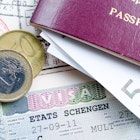
Dec 11, 2019 • 5 min read

Oct 28, 2019 • 19 min read

Jun 15, 2024 • 9 min read

Jun 15, 2024 • 17 min read

Jun 11, 2024 • 5 min read

Tourists can now stay longer in Thailand with new extended visa
Thailand to welcome longer stays.
T ourists will be allowed to stay in the gorgeous country of Thailand for even longer periods now, after authorities announced a visa extension recently.
According to visaguide.news , this extended visa will aslo apply to remote workers, postgraduate students and retirees.
As per government spokesperson Chai Wacharonke, as of June 2024, travellers from 93 countries, including South Africa, will be permitted to stay in Thailand for up to 60 days.
Travel News also reported that Thailand’s single-entry tourist visa allows for stays of up to 90 days, and although South Africans previously had to apply for visa extensions after their initial 30 visa-free days, they can now apply for an extension after 60 days.
Bali implements new tourism tax
In other popular tourist destination news, the beautiful island paradise of Bali recently began charging tourists a tourism tax to visit the island.
According to reports , the Bali Provincial government finalised the International Tourism Levy, a tax on inbound tourists, of US$10 (R188) per passenger, per trip and implemented it on 14 February 2024.
The new entry fee will be used to to fund Bali’s cultural heritage as well as be put towards sustainability efforts including coral reef conservation, mangrove rehabilitation and other projects.
In order to pay this tax, tourists will have to make the application payment through the Love Bali website or the app before arrival. A tourism levy voucher will then be emailed, and travellers will need to keep this voucher on their smartphones for scanning at checkpoints at Bali Airport.
The post Tourists can now stay longer in Thailand with new extended visa appeared first on SAPeople - Worldwide South African News .

Advertisement
Supported by
Clarence Thomas, in Financial Disclosure, Acknowledges 2019 Trips Paid by Harlan Crow
The justice amended an earlier filing to include vacations to Bali and an exclusive California club paid for by the Texas billionaire Harlan Crow.
- Share full article

By Abbie VanSickle
Justice Clarence Thomas acknowledged on Friday additional luxury travel he had accepted from a conservative billionaire, amending a previous financial disclosure to reflect trips he had taken to an Indonesian island and a secretive all-male club in the Northern California redwoods.
The trips, taken in 2019, were earlier revealed by ProPublica , but it is the first time that Justice Thomas has included them on his financial disclosures .
Other Supreme Court justices chronicled their gifts, travel and money earned from books and teaching. Justice Ketanji Brown Jackson reported receiving four concert tickets valued at about $3,700 from Beyoncé and $10,000 of artwork for her chambers from the Alabama artist and musician Lonnie Holley .
The financial disclosures, released yearly, are one of the few public records available about the justices’ lives, providing select details of their activities outside the court. A steady drumbeat of revelations about ties between some of the justices and wealthy donors has only intensified interest in the reports, particularly after disclosures that Justice Thomas had accepted lavish gifts and travel from affluent friends over decades.
Books are one of the few ways that the justices can earn outside, uncapped money . Justice Jackson reported $893,750 from an advance for her coming book, a memoir. Justice Neil M. Gorsuch listed a book advance of $250,000.
Justice Brett M. Kavanaugh disclosed a $340,000 advance. He is working on a legal memoir, still untitled, and is expected to offer a firsthand account of his contentious confirmation hearing in 2018 and an attempt on his life in 2022. The deal was earlier reported by Axios .
Justice Sonia Sotomayor continued to earn royalties for her books, including about $87,000 in proceeds this year. She cited about $1,900 for voicing a character on an animated children’s show on PBS, “Alma’s Way,” about a Puerto Rican girl from the Bronx and her family. The narrative arc is not unfamiliar to the justice, whose Puerto Rican parents raised her in public housing in the Bronx.
The 2019 trips disclosed by Justice Thomas refer to two excursions with Harlan Crow, a Texas real estate magnate and donor to conservative causes. During one, he and his wife, Virginia Thomas, flew aboard Mr. Crow’s private jet to Indonesia, where they spent more than a week island-hopping on Mr. Crow’s superyacht.
Justice Thomas did not provide a dollar value on his disclosure form, but ProPublica had estimated that if Justice Thomas had paid for the plane trip and yacht himself, the trip could have exceeded $500,000.
The second trip, listed as a visit to Monte Rio, Calif., appears to be an excursion to Bohemian Grove, an exclusive retreat held on a 2,700-acre property in Sonoma County, north of San Francisco. Mr. Crow is a member of the club.
Justice Thomas did not report any gifts or private jet flights or travel from benefactors for 2023, the year covered by the most recent disclosures. He listed only one gift, a pair of photo albums worth $2,000 from Terrence and Barbara Giroux. Mr. Giroux is the departing executive director of the Horatio Alger Association of Distinguished Americans, an exclusive group that includes figures at some of the highest echelons of society.
As a member of the group, Justice Thomas has granted it unusual access to the Supreme Court, presiding over an annual ceremony in the courtroom and meeting with and mentoring the recipients of college scholarships awarded by the group and worth millions of dollars a year; many come from backgrounds that mirror his own.
Justice Samuel A. Alito Jr. was granted an extension this year, said the Administrative Office of the U.S. Courts, which offers support for the federal judiciary and handles the financial records . That is in keeping with his typical practice. According to Fix the Court, an advocacy group critical of the court’s lack of transparency, for more than a decade he has delayed filing his disclosure.
Last year, both Justice Thomas and Justice Alito requested and received extensions on filing their disclosure forms. Neither cited a reason in asking for a delay.

Read Justice Clarence Thomas’s Financial Disclosures for 2023
The Supreme Court justice also included an amendment for his 2019 filing.
When his form was released to the public , Justice Thomas had included an unusual addendum, a statement defending his acceptance of gifts from Mr. Crow . In reporting a real estate deal, a sale of his mother’s single-family home to Mr. Crow, he said in the statement that he had “inadvertently omitted” such information, which also sought to justify his decision to fly on private jets. He stated that he had been advised to avoid commercial travel after the leak of the draft opinion overturning Roe v. Wade. However, he did not list any private plane travel in 2023.
The Supreme Court, under mounting pressure and intense public scrutiny, adopted its first ethics code in November. Judges in lower federal courts have long been bound by a code, but the Supreme Court has never been subject to those requirements because of its special constitutional status.
Still the lack of enforcement mechanism or a process to handle ethics complaints drew criticism , as did the absence of any specific restrictions on gifts, travel or real estate deals.
However, the nine-page code cautioned that members of the Supreme Court should not participate in activities that “detract from the dignity” of the job, interfere with a justice’s ability to carry out official duties, “reflect adversely on the justice’s impartiality” or “lead to frequent disqualification.”
Elizabeth A. Harris contributed reporting.
Abbie VanSickle covers the United States Supreme Court for The Times. She is a lawyer and has an extensive background in investigative reporting. More about Abbie VanSickle

IMAGES
COMMENTS
Bali Tourist Tax / Bali Tourist Levy. The Tourist Tax for international visitors to Bali is a tax charged by Bali's provincial government. This is all you need to know to get ready to come to Bali. Make sure you are only using the links mentioned tha guide you to the official website of the Bali government.
1. How much is the Bali Tourist Tax? The Bali Tourist Tax or Tourist Levy costs 150,000 IDR - approximately $15.00 AUD, $10.00 USD, or 9.00 EUR - per person. This tax can be paid online or at Bali Airport. This is a one-time fee upon entry to Bali and is won't hurt your pocket too much compared to most countries who do charge a tourist tax - which is usually added on to accommodation ...
Beginning Feb. 14, 2024, foreign tourists visiting Bali must pay a tourist tax of IDR 150,000. The Bali provincial government has introduced the International Tourism Levy to support the preservation of Bali's rich customs, traditions, arts, and environment. The levy will apply to all international visitors, including adults and children of ...
Yes. The visa on arrival (VOA) costs 500,000 IDR or about $50 and lasts up to 30 days. Australia is one of 159 countries whose tourists must pay the fee — which covers travel all over Indonesia ...
How to pay the tourist levy. You can pay the $15 fee via the lovebali.baliprov.go.id website or Love Bali app. You will need to enter your details, including your passport number and arrival date ...
Bali Introduces Tourist Tax From February 14th 2024. As of February 14, 2024, a new initiative called the Bali Levy ( known as the New Bali Tourist Tax) awaits all international tourists. For a small investment of IDR 150,000 (USD 10), this tax supports Bali's unique cultural heritage and enhances the island's commitment to sustainable tourism.
Visiting the popular Indonesian destination of Bali just got more expensive thanks to a tourist tax that went into effect on Wednesday. The new tax, which travelers can pay online on the Love Bali ...
Visitors to Bali, Indonesia, will see a small payment of Rp150,000 (approximately US$10). This tourism tax helps manage mass tourism's impact on Bali. 3. How Far in advance can I pay the new Bali tourist tax. Currently, the online payment facility only allows payment for arrival dates up to two months in advance.
The Bali provincial government has announced a new tourism tax of IDR 150,000 per visitor, applicable to international tourists entering the island. The tourism tax policy is being introduced as part of a bigger mission by the Provincial Government to promote sustainable and dignified tourism in Bali. The revenue generated from this tax will be ...
Bali, 11th October 2023. In a move that has stirred discussion throughout the year, Bali's new tourism tax now has a confirmed launch date for all international visitors. On February 14, 2024, this idyllic island destination will introduce the anticipated tourism tax.Tjok Bagus Pemayun, Head of the Bali Tourism Department, officially disclosed this development to the media.
Bali Tourist Tax Regulations. The Bali Tourist Tax amounts to IDR 150,000 per person (approximately USD 10 or AUD 15), irrespective of the traveler's age. Additionally, there's a surcharge of Rp 4,500 for online payments. Also read: Bali Entry Requirements: The Complete Guide.
From Feb. 14, foreign travelers visiting Bali in Indonesia will be required to pay a new tourist tax upon entry or before visiting the region. The fee costs 150,000 rupiahs (around $9.50) and is in addition to any other visa fees. The tax aims to combat overtourism on the popular island. Although the fee will not currently be enforced in other ...
Starting Feb 14, 2024, Bali will implement a new tourist tax of INR 793.46 aimed at preserving the environment while boosting its revenue. Tourist-dependent Bali attracts millions of foreign visitors annually, drawn to its palm-fringed coasts and adventure-filled excursions. The beach-dotted island aims to capitalise on its popularity to boost ...
Explainer: Everything you need to know about Bali's new tourist tax. It remains a holiday hotspot for Aussies - but Bali is now slapping travellers with a $15 fee. The Indonesian province's new "tourist tax" will see it make millions a year from visitors. It says the money- which will add up to millions each year - will be spent on ...
However, with the introduction of the Bali Tourist Tax in 2024, it's important to know this information before your next trip. ... Travel Requirements. Read our guide on Bali's tourist tax and how it supports Bali Island. Vacation to Bali. Discover Bali's Best: Tropilogy's Guide to Beaches, Dining & Must-Visits. Bali Experiences.
The new tourist tax is effective since 14th February 2024 (Tourist Levy for INTERNATIONAL visitors) The Fee is IDR 150,000 per person (ca. USD 10 and AUD 15) The tourist tax (levy) is a local tax that the Bali administration government implemented. It is only related to Bali and not to Indonesia
Jakarta, 02 February 2024 -The Bali Provincial Government is set to enforce new tourist tax regulations from February 14, 2024. Indonesia AirAsia wishes to inform all foreign tourists planning a visit to Bali about the mandatory tourist levy of IDR 150,000 or USD 10, in adherence to Law Number 15 of 2023 of the Province of Bali.
And in July, Bali governor Wayan Koster announced a $10 tourist tax that will go into effect mid-2024. The one-time fee will apply to foreign visitors only and be paid electronically.
Bali designed a new tourist tax that will be implemented from 14th February 2024. Here is what you need to know. [email protected] +62 21 300 297 27 ... This KITAS type is specifically tailored for ex-Indonesian citizens who plan to live in Indonesia again for leisure or travel purposes. 1-year visa validity ; The visa is renewable ;
Aussies heading to the holiday island of Bali will have to pay a new tourism tax when they arrive in the province as of February 14 next year. Authorities have officially confirmed the cost will ...
Japan recently voted to impose a " departure tax " for foreign travelers. The fee is ¥1,000, or about $9, and will go toward the cost of building and maintaining tourist infrastructure. The ...
All foreigners including Singaporeans will have to pay 150,000 rupiah (S$13) in tourism tax when they visit Indonesia's Bali from Feb 14 onwards.. The new tourism tax applies to those visiting ...
Effective from February 2015, all airlines will include the passenger service charge (PSC) in the ticket price. This means that you no longer have to line up to pay the 200,000 IDR departure tax to immigration when leaving. This is a big win for travellers, as you no longer need to factor in extra time to make your departure time, nor do you ...
Latest update: The Bali Provincial Government has introduced a new tourist levy of IDR 150,000 per person to foreign tourists entering Bali. The tourist levy is separate from the e-Visa on Arrival or the Visa on Arrival. Cashless payments can be made online prior to travel or on arrival at designated payment counters at Bali's airport and seaport.
More popular areas have no shortage of ridiculously cheap hostels, but bars and restaurants tend to be more expensive in remote areas. 2. Eat (and drink) like a local. One of the best ways to cut the costs of a Bali vacation is to make a beeline for warungs - small, family-run restaurants and street food stalls.
According to reports, the Bali Provincial government finalised the International Tourism Levy, a tax on inbound tourists, of US$10 (R188) per passenger, per trip and implemented it on 14 February ...
The justice amended an earlier filing to include vacations to Bali and an exclusive California club paid for by the Texas billionaire Harlan Crow. By Abbie VanSickle Justice Clarence Thomas ...